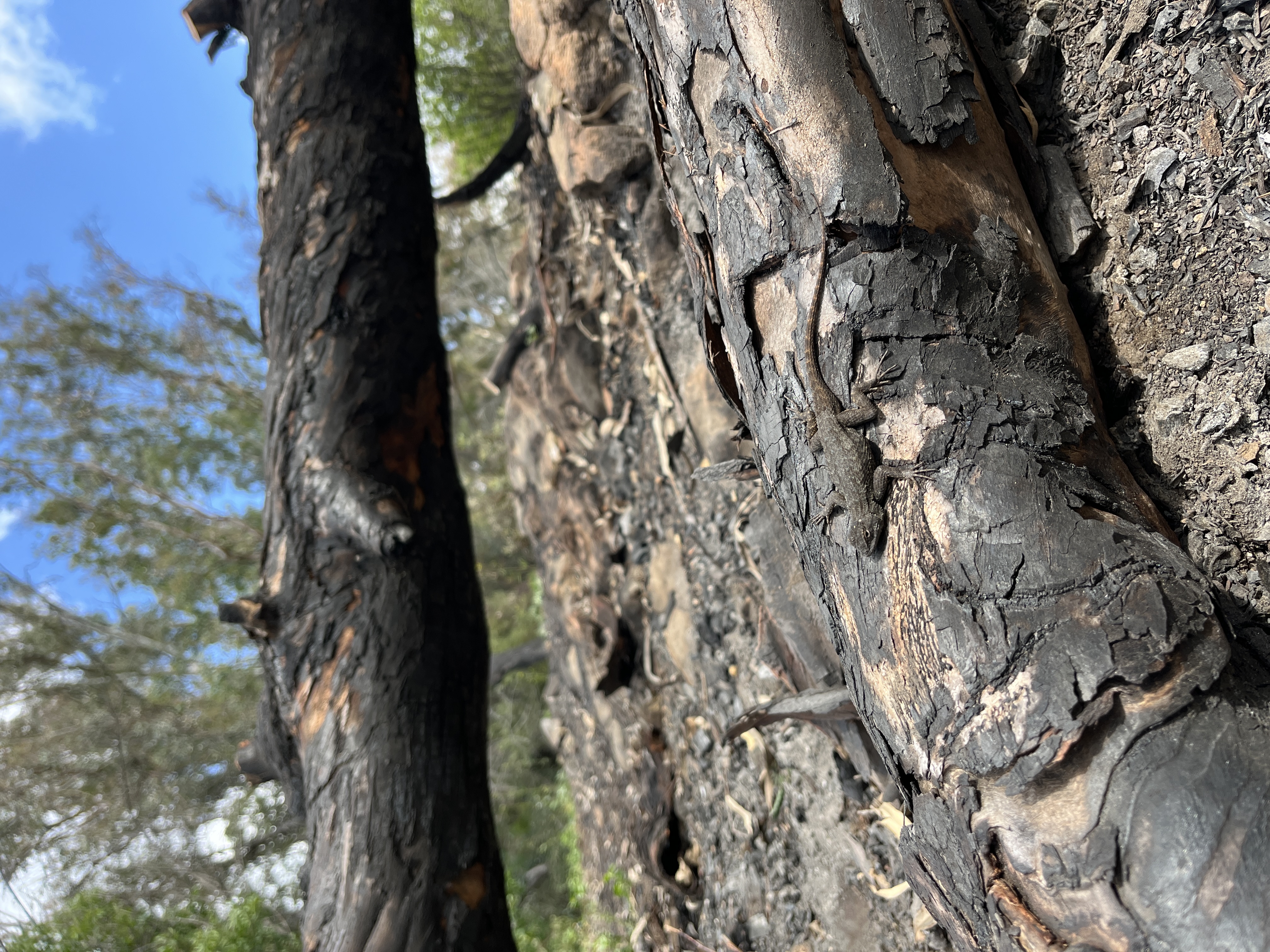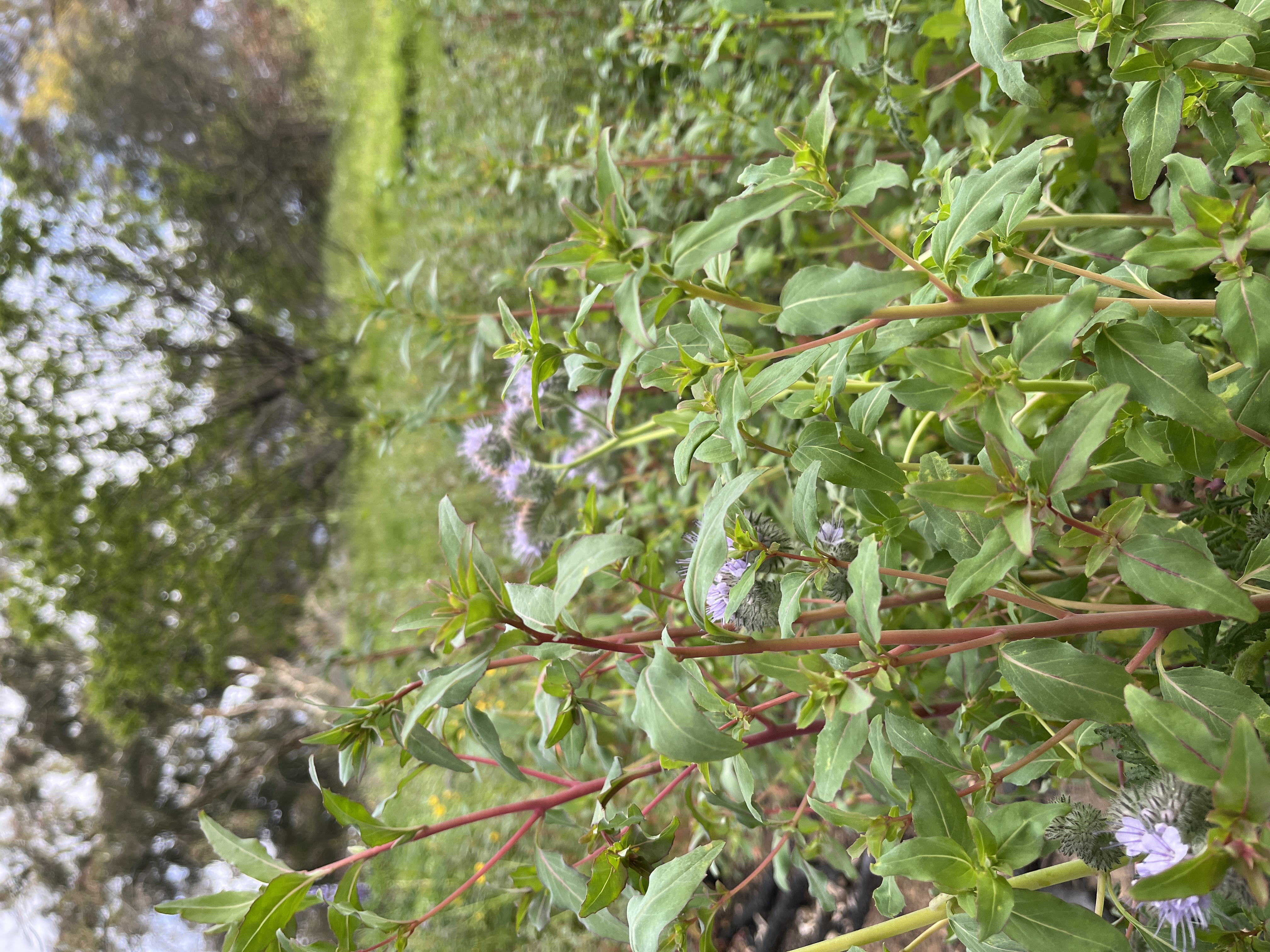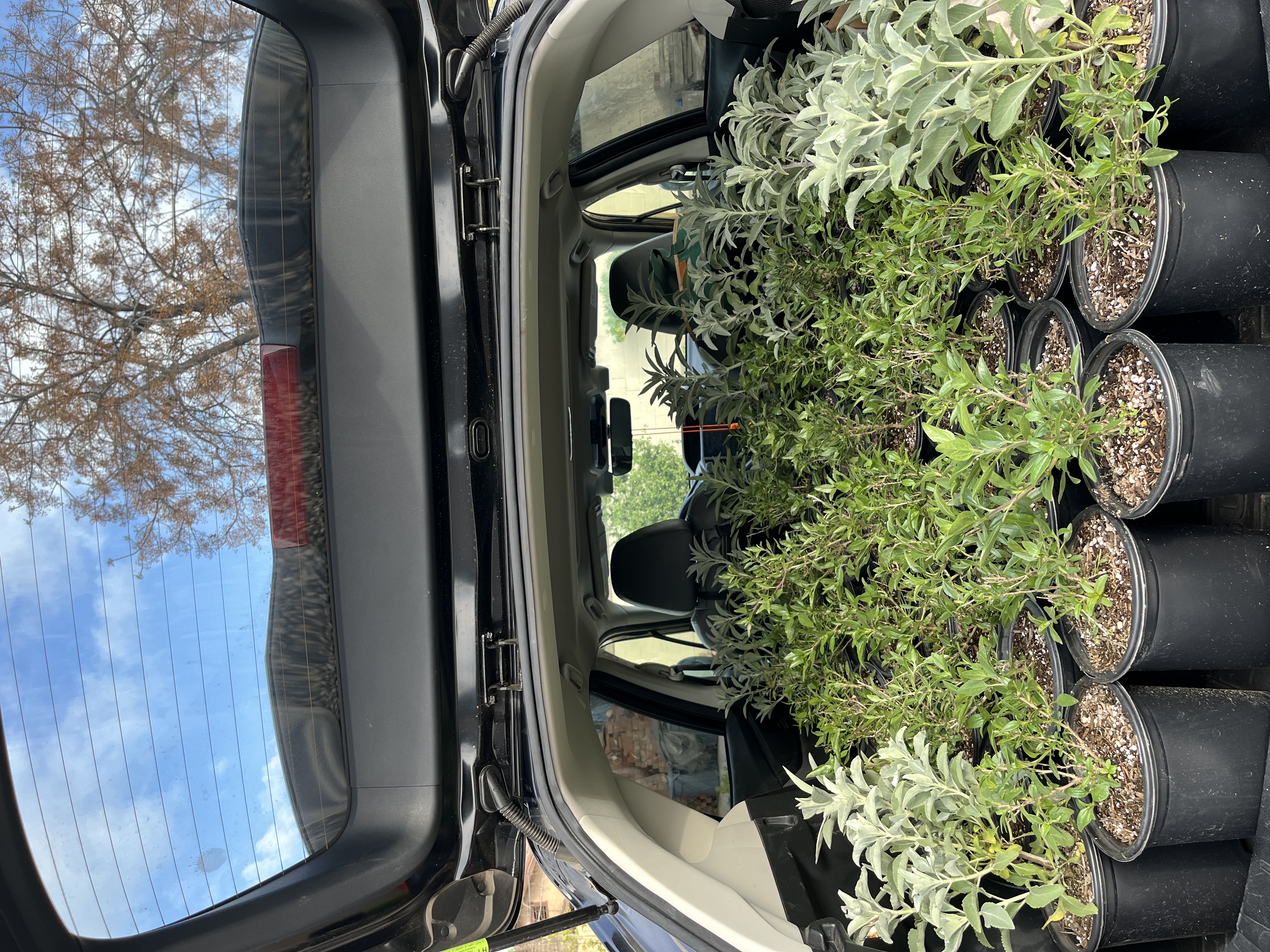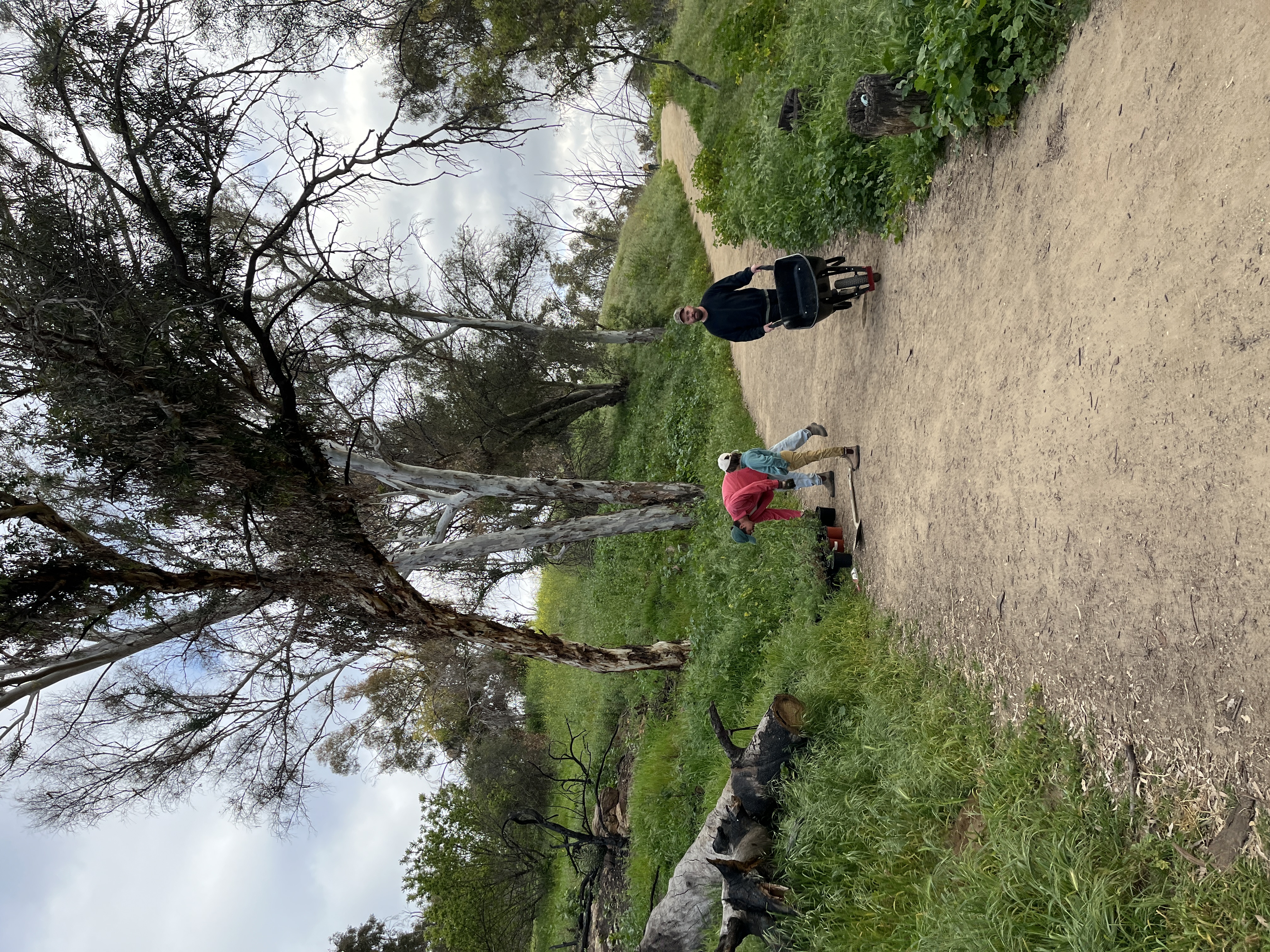
POST-JANUARY LA FIRES CHECK IN
Burn Scar Test Plot
By Hannah Pae
Terremoto
DATE: February 27, 2025
It’s been about two months since the wildfires started in Los Angeles at the start of the year, and life before the fires seems like a distant past that we will never be able to go back to. Amidst the immediate fear, destabilization, and heart-wrenching grief over our city and our collective unknown future, I’ve experienced glimmers of hope while observing the resilience of the native flora and fauna during the times I’ve come back to Burn Scar post- LA fires to check in on how everything has been holding up after the extreme, drying Santa Ana winds, the LA fires, and late winter rain storms the past couple of weeks.
Soon after the brush fire in Elysian Park in fall 2023 that burned through the Burn Scar Test Plot, we noticed toyon sprouting back from charred stumps. A year and four months later today, the toyon sprouting back from the base of a charred branching arch has grown to be almost 5’ tall, with toyon seedlings coming up nearby – a true testament to the resilient nature of our fire adapted ecology.
Charred logs that we’d sawed and laid on the ground have inadvertently taken on the critical role of nurse logs for wildflower seedlings from last year’s seed bank – baby lupine, clarkia, and lacy phacelia – that are taking advantage of the sheltered microclimate created by the logs. A few months before the LA fires, we’d also spread native seeds we’d collected from nearby intact chaparral ecosystems in Elysian Park, and I expect we’ll finally see these seedlings pop up in the next few weeks, now that we’ve finally had a couple long-awaited, bittersweet, winter storm events in LA post-fire.
We’ve had to postpone our volunteer work day in January because of the LA fires, but we are looking forward to having our first volunteer work day of the year in a few weeks – Fri, March 14th – and working in community to care for this land together.
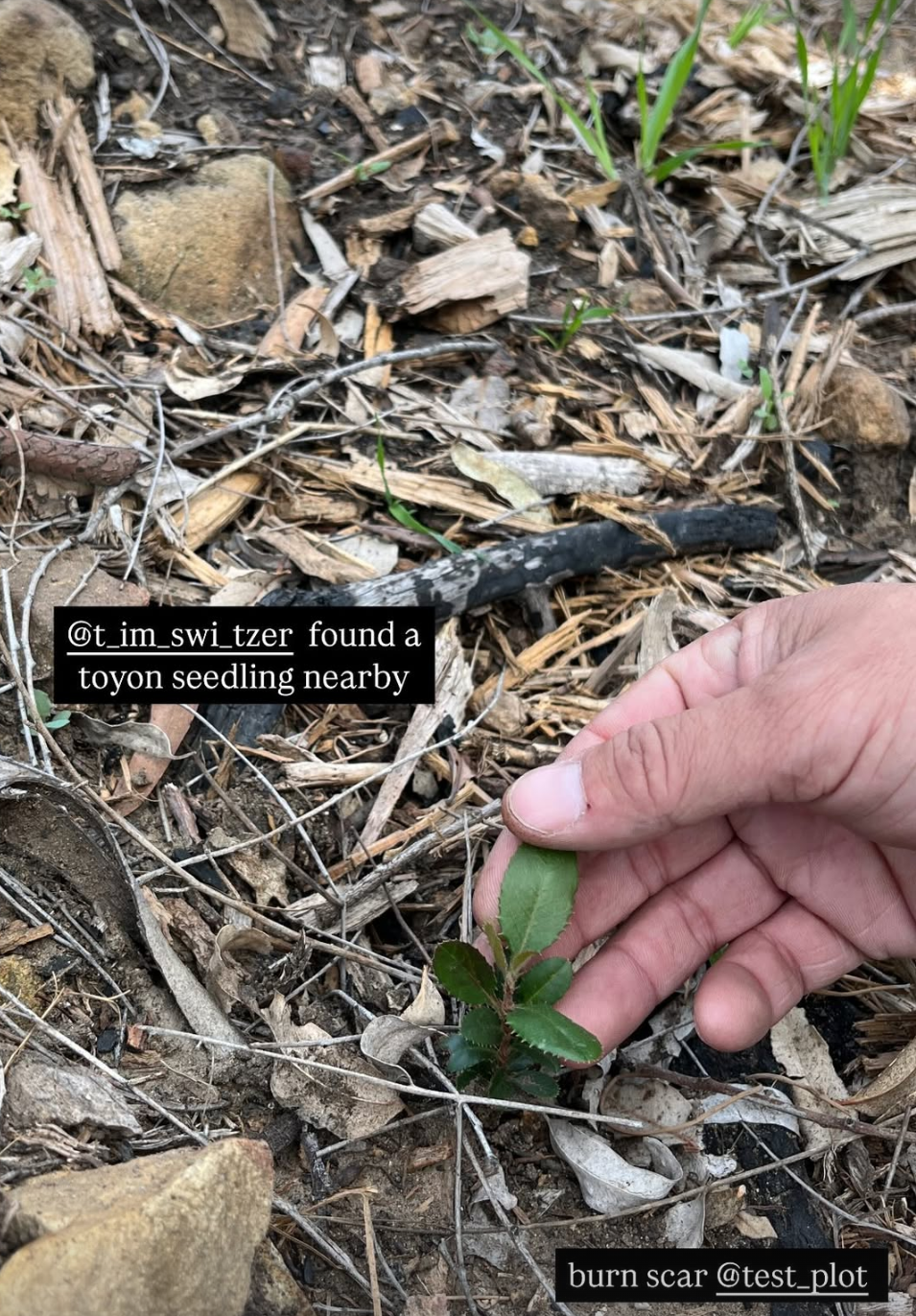
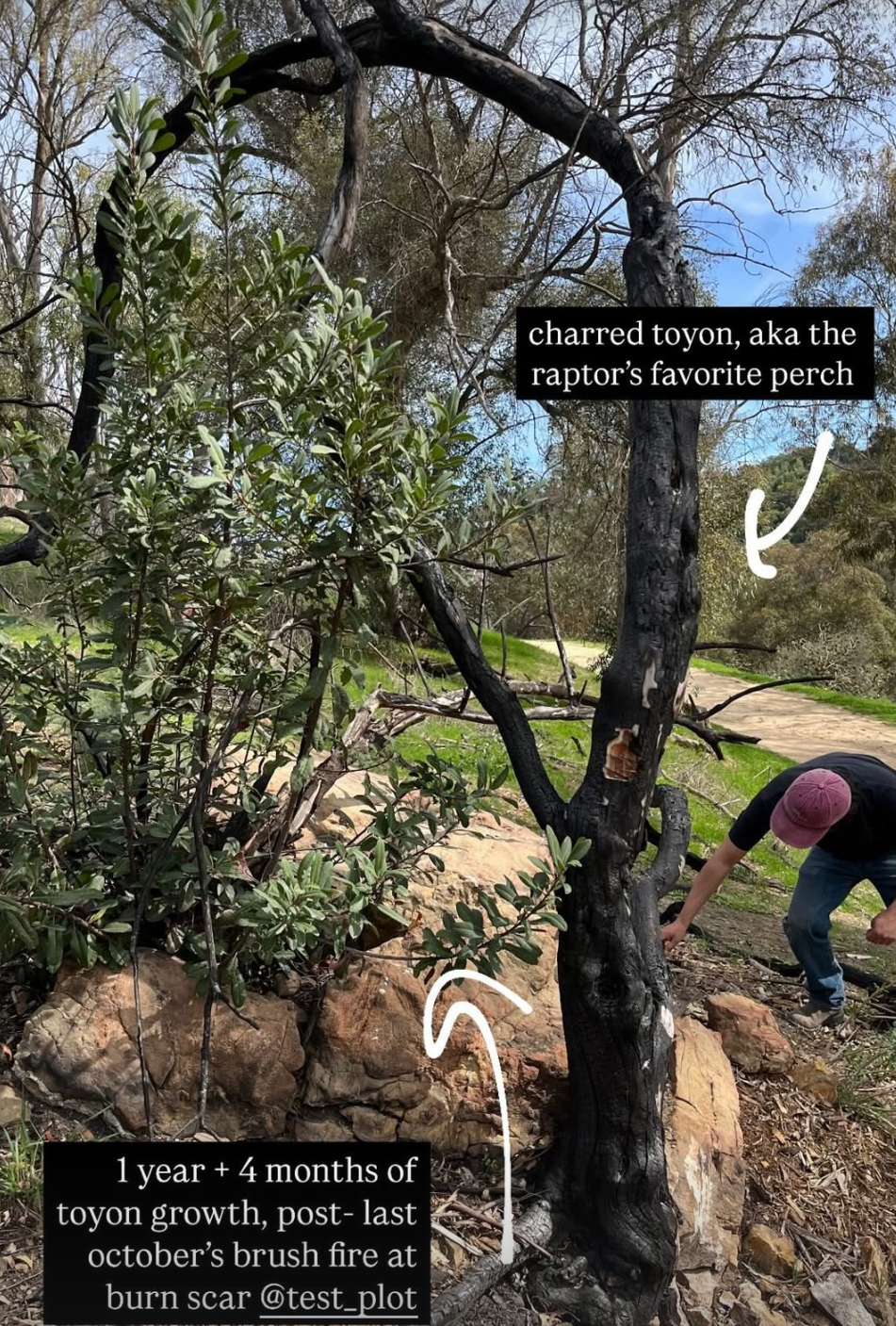
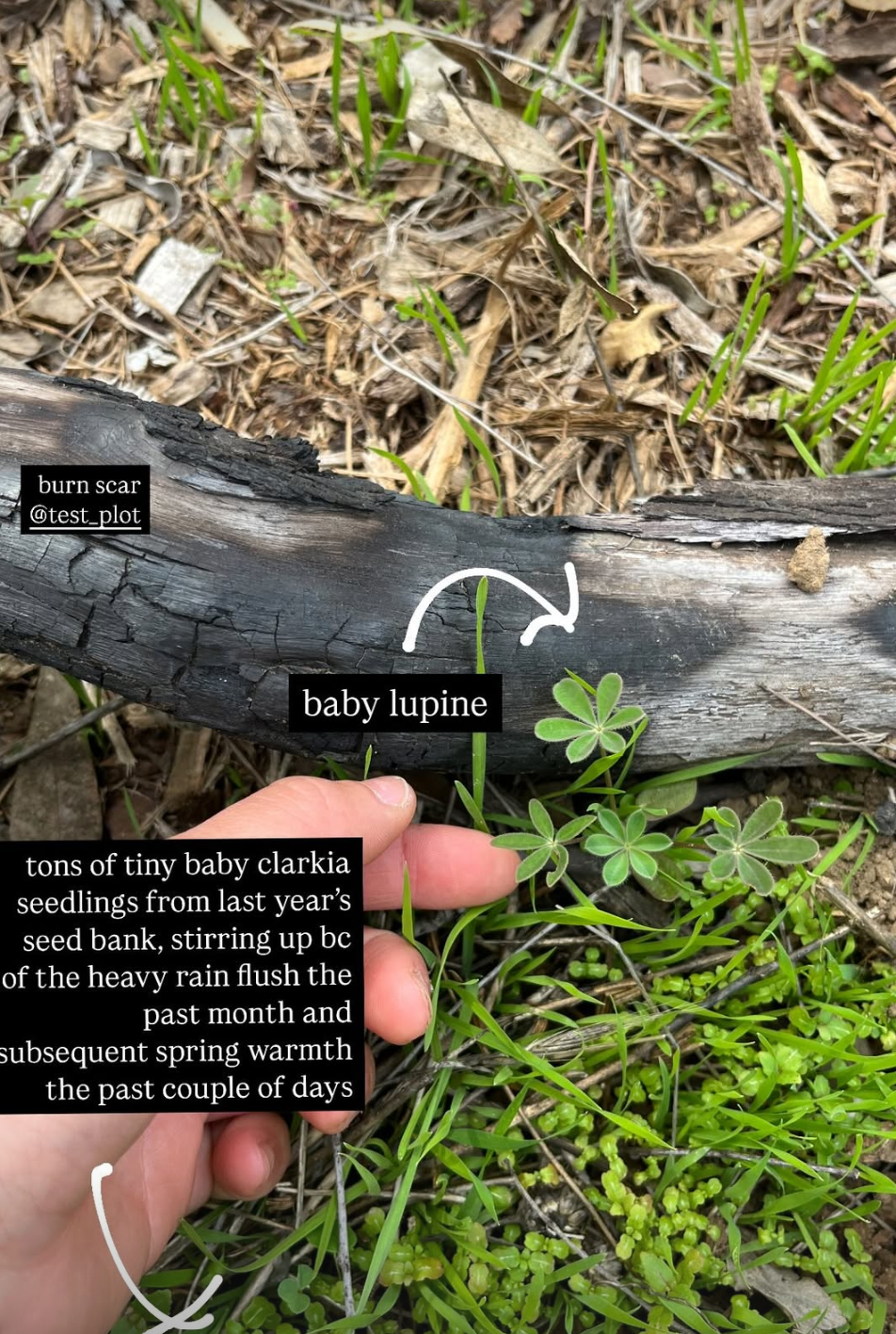





JULY AT THE BURN SCAR
Burn Scar Test Plot
By Hannah Pae
Terremoto
TIME: 8:00-11:30am
DATE: July 14, 2024
TEMP: 70-76 deg
WEATHER: partly cloudy
WIND (SPEED/DIRECTION): 3 mph / north
SOIL MOISTURE: dry
PLANTS SIGHTINGS:
-Some CA poppy
-A few late blooming clarkia!
-American Bird’s Foot Trefoil (Acmispon americanus) + Clustered Tarweed (Deinandra fasciculata) are blooming through the dried out clarkia stalks
WEED SIGHTINGS: Pokeweed and a few small black mustard
Burn Scar Test Plot
By Hannah Pae
Terremoto
TIME: 8:00-11:30am
DATE: July 14, 2024
TEMP: 70-76 deg
WEATHER: partly cloudy
WIND (SPEED/DIRECTION): 3 mph / north
SOIL MOISTURE: dry
PLANTS SIGHTINGS:
-Some CA poppy
-A few late blooming clarkia!
-American Bird’s Foot Trefoil (Acmispon americanus) + Clustered Tarweed (Deinandra fasciculata) are blooming through the dried out clarkia stalks
WEED SIGHTINGS: Pokeweed and a few small black mustard
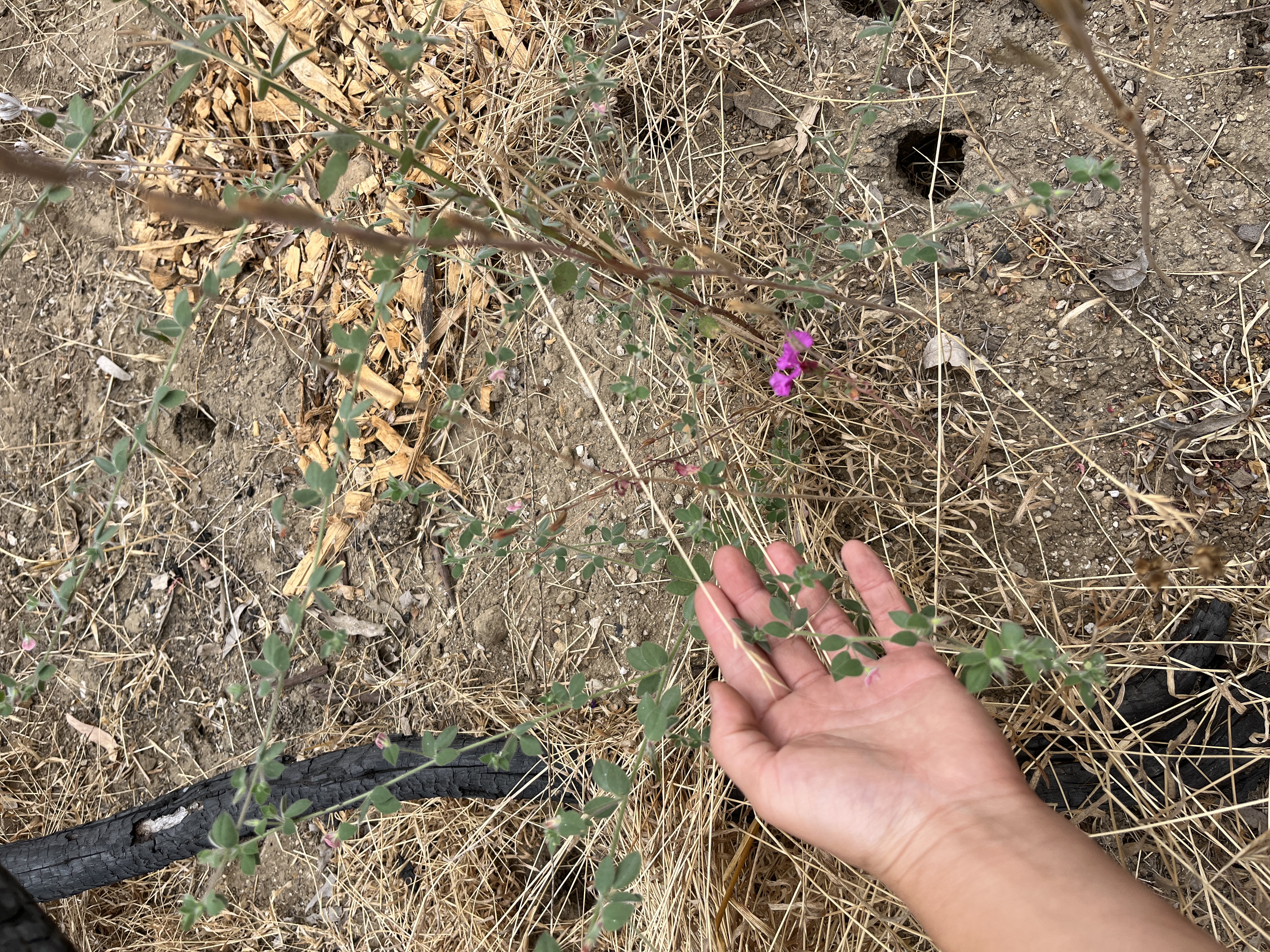
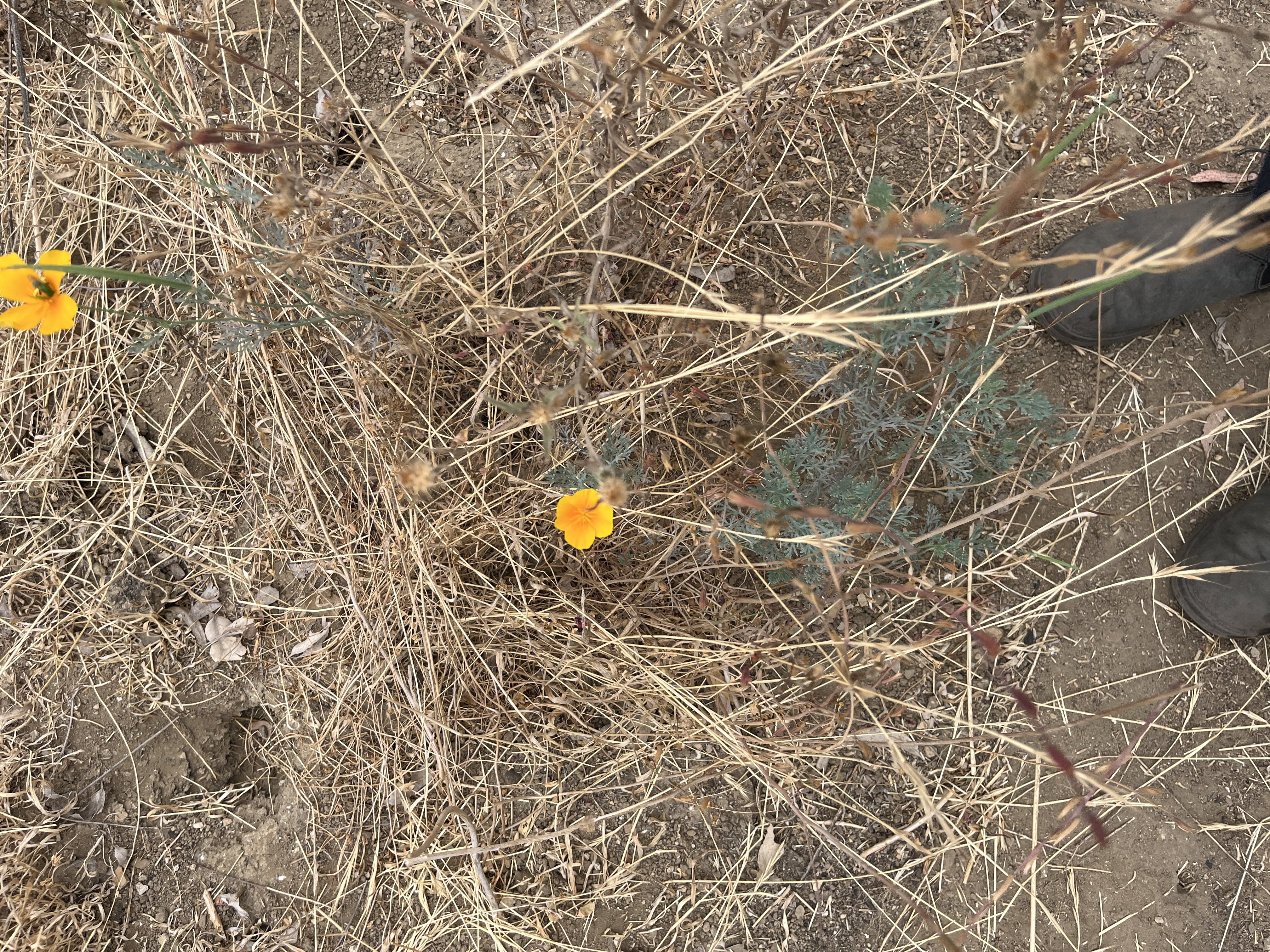
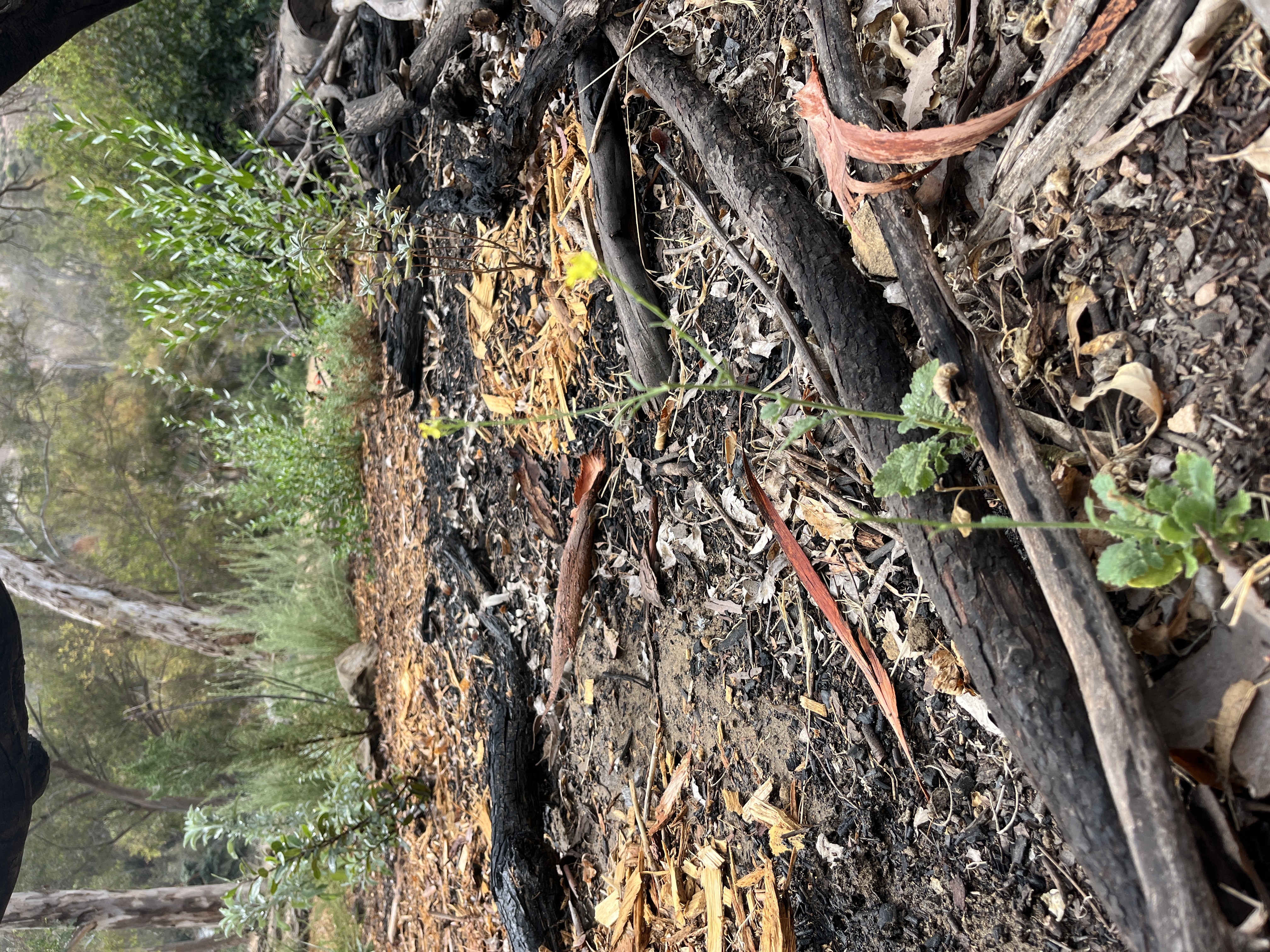

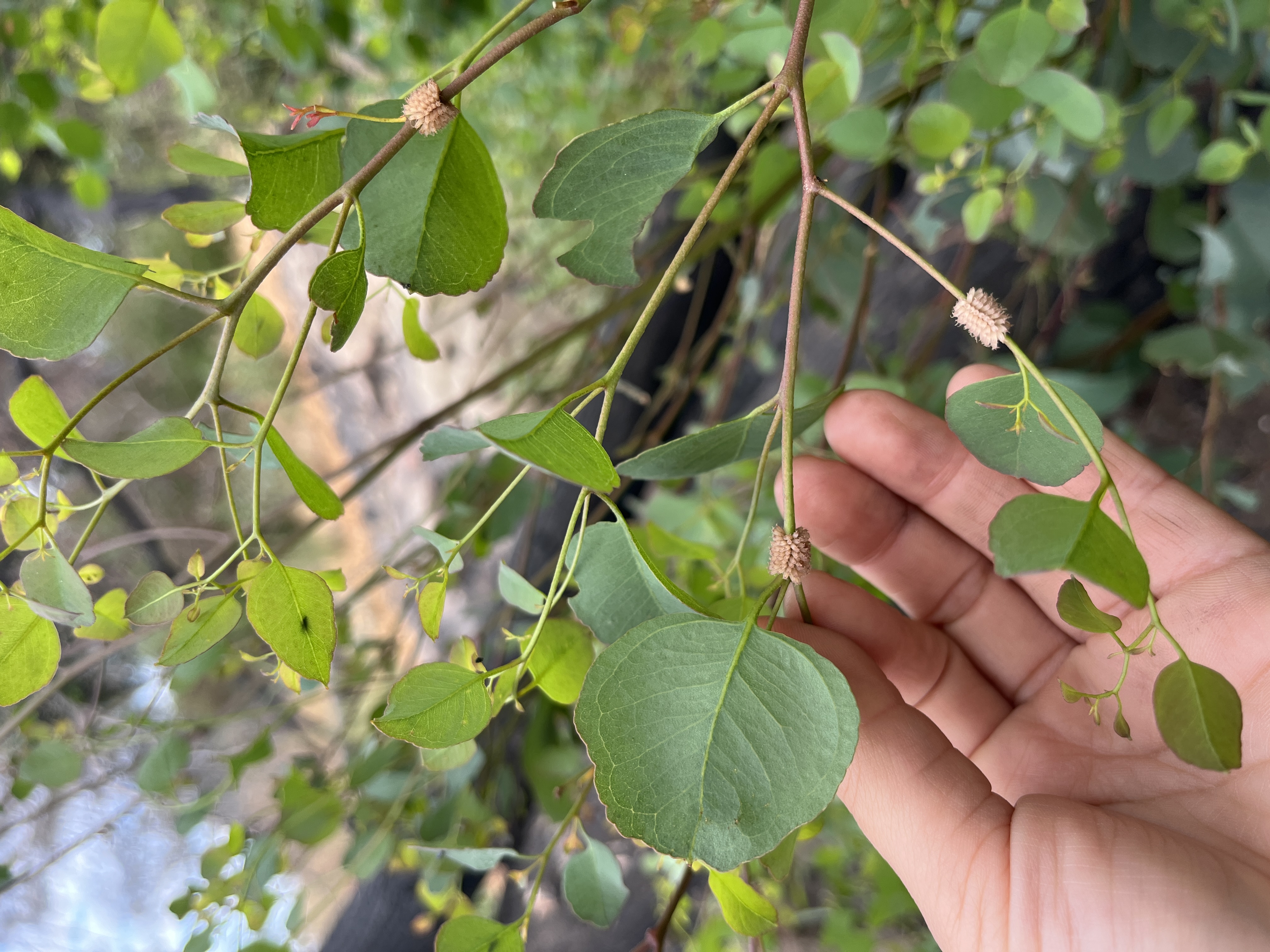

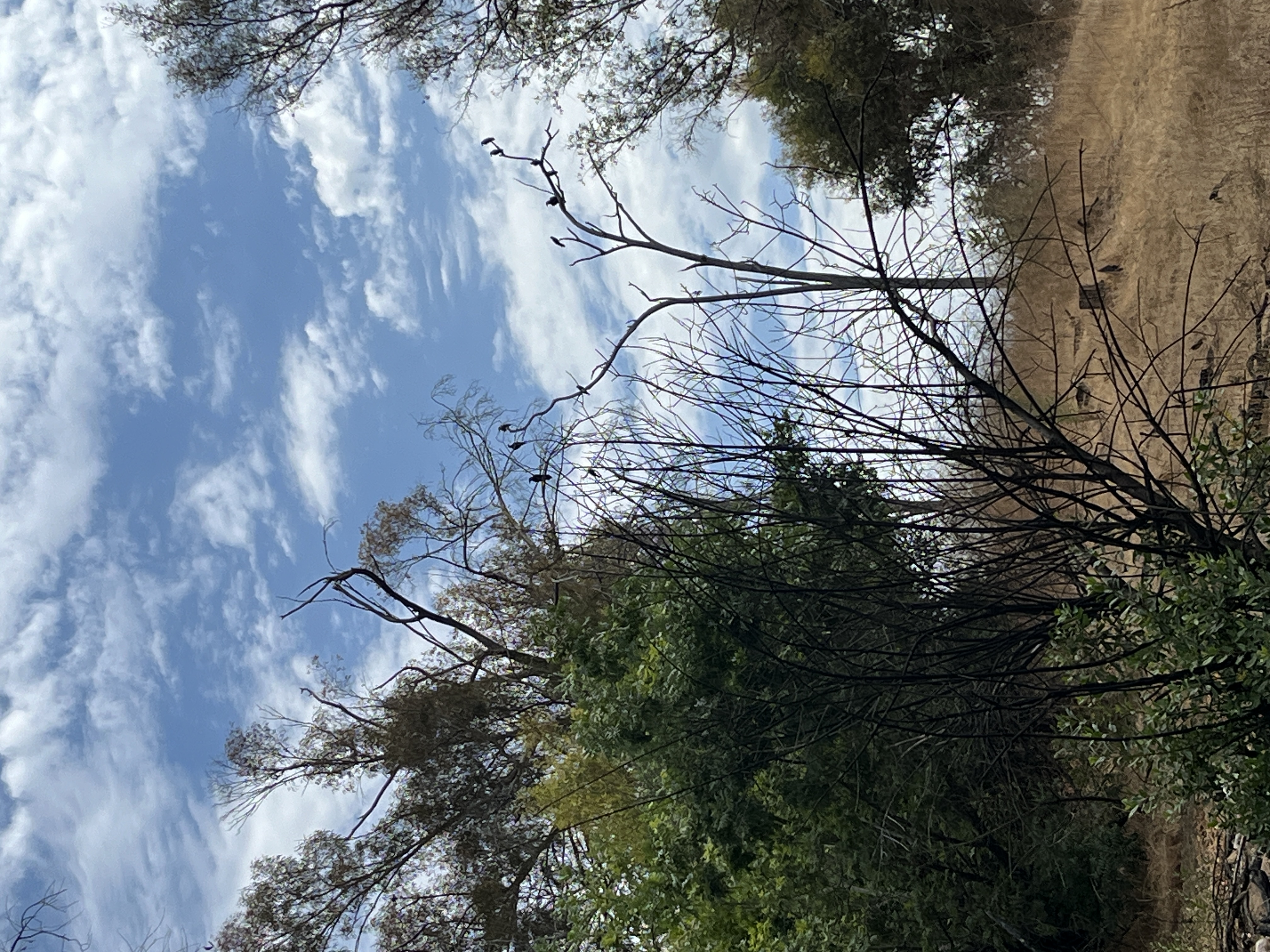



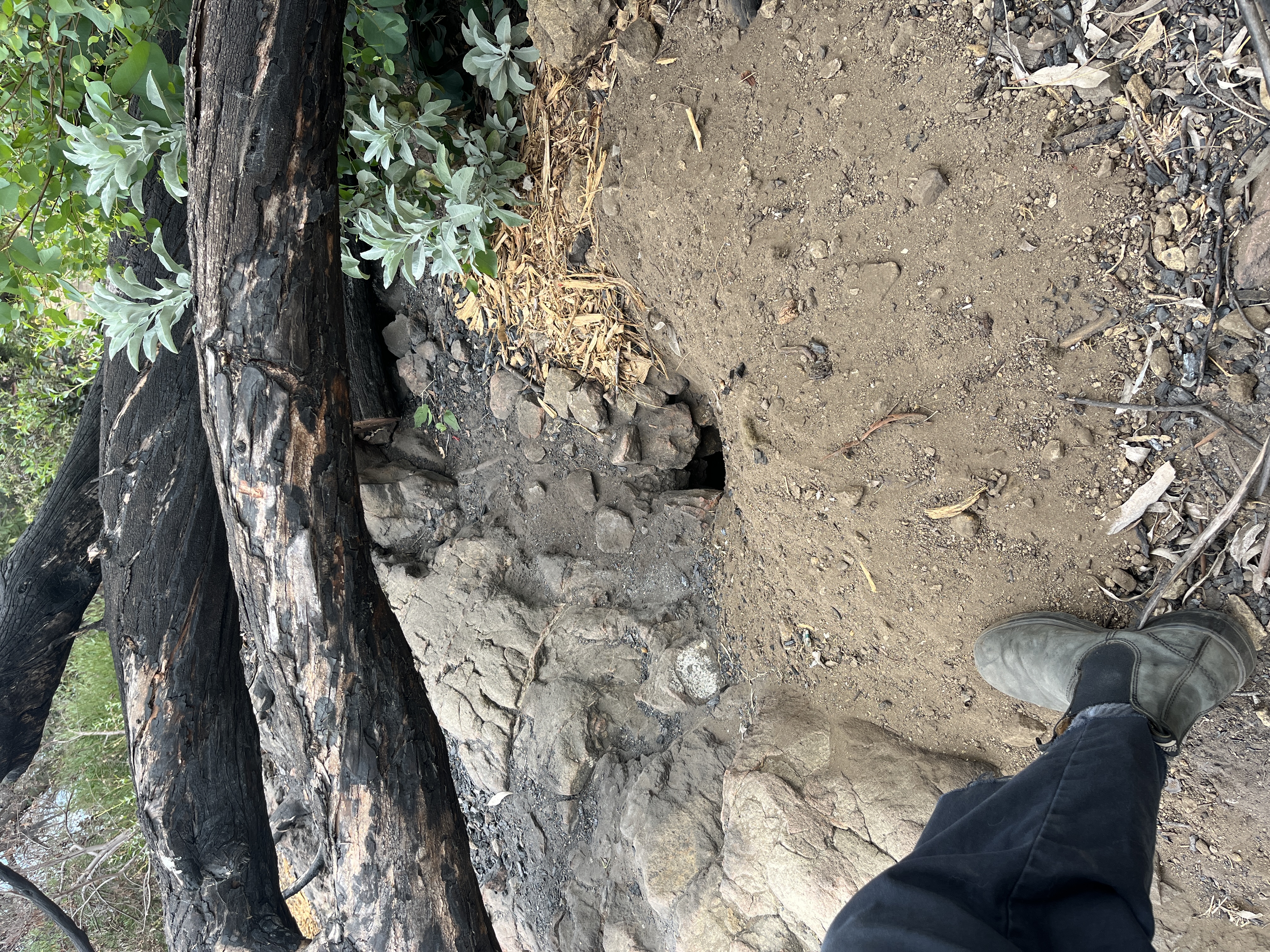
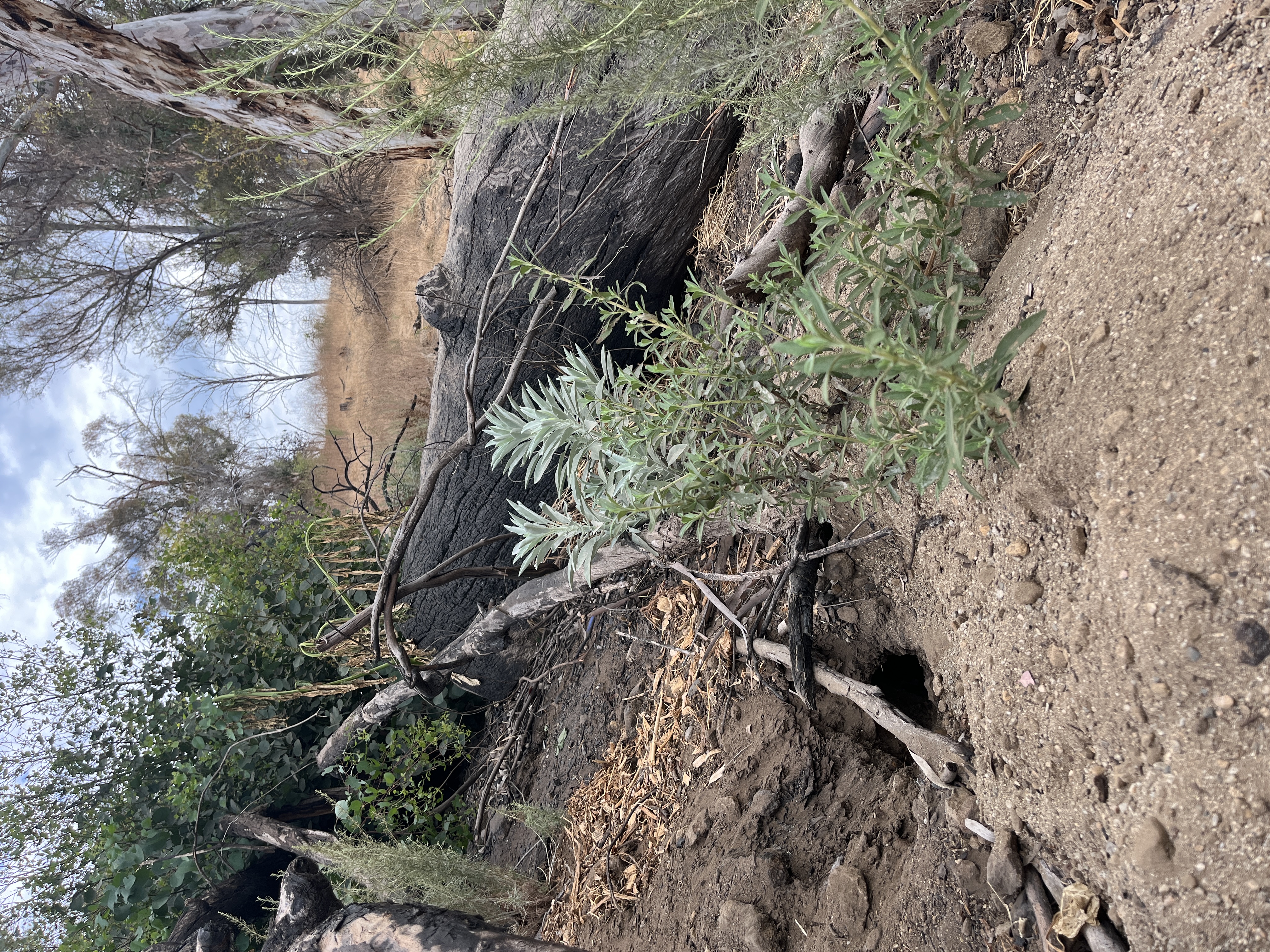
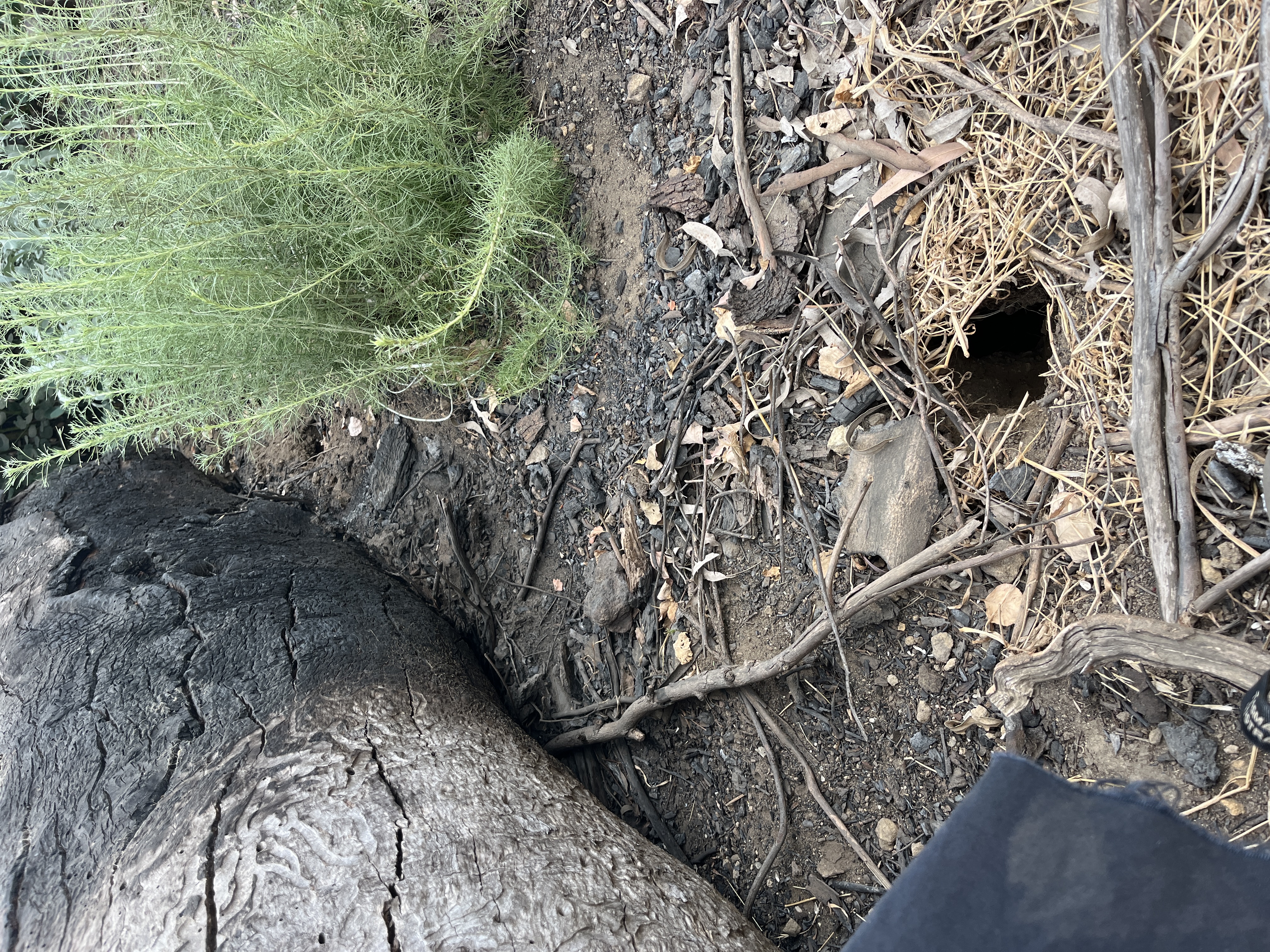
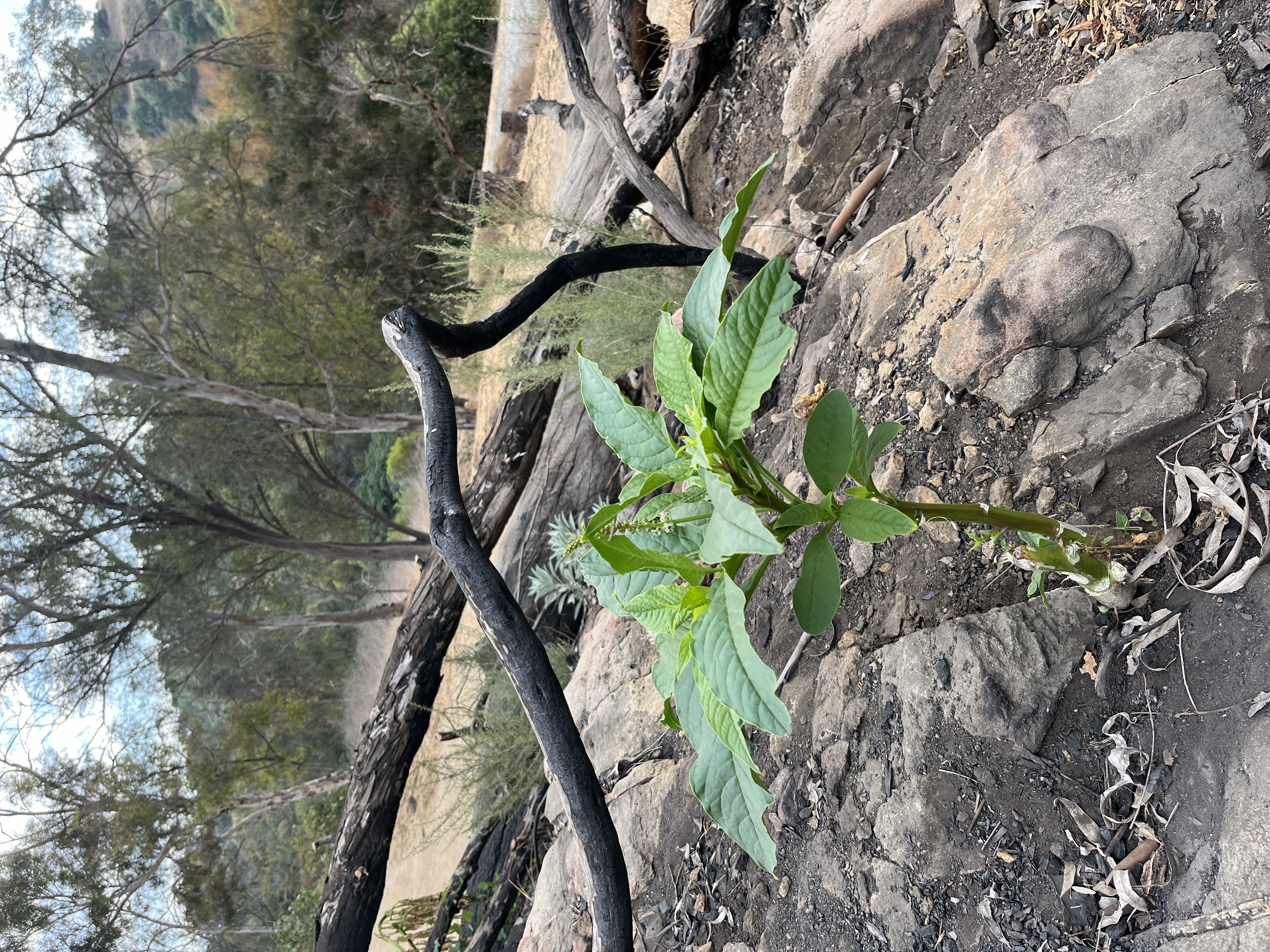

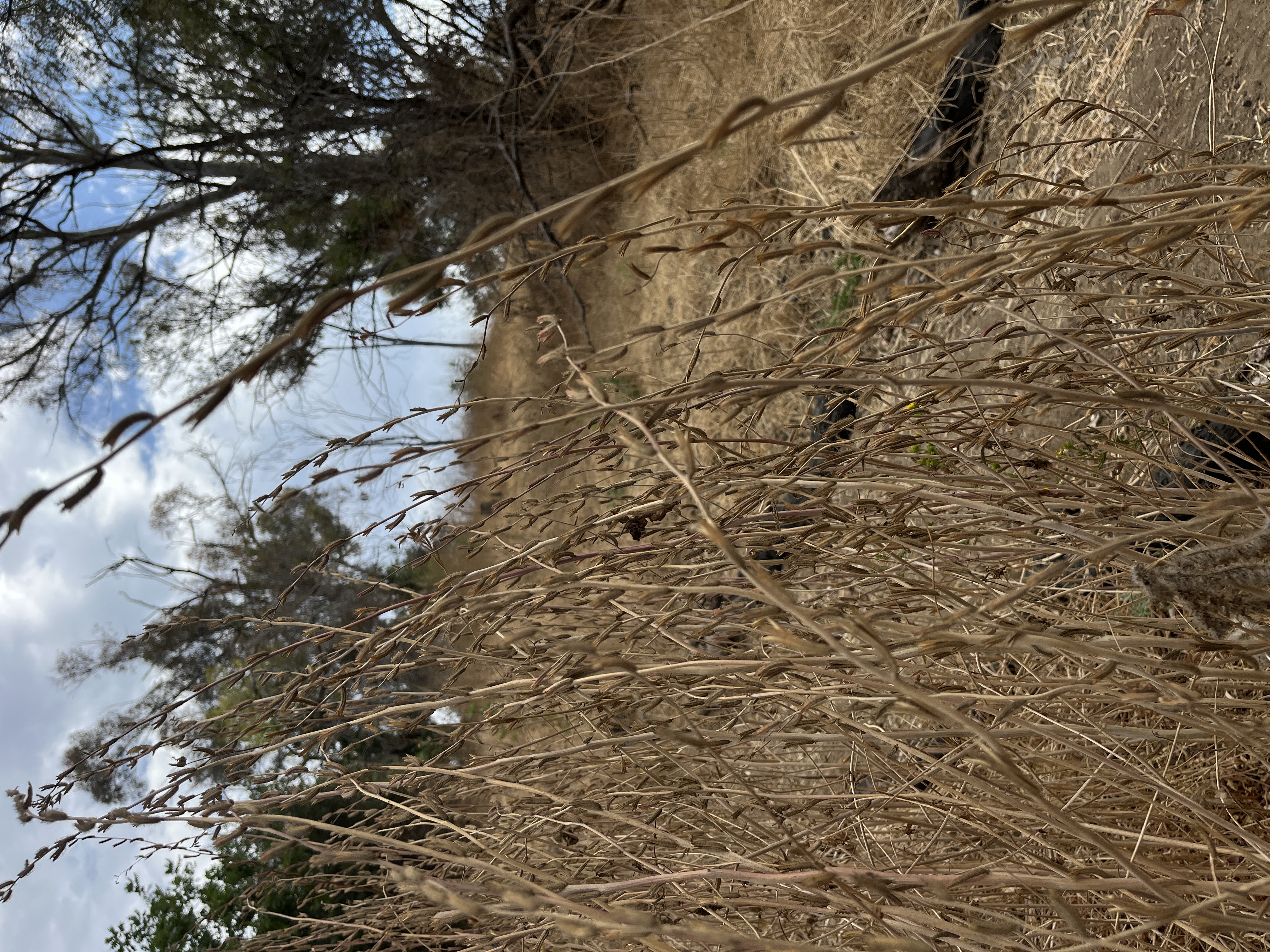


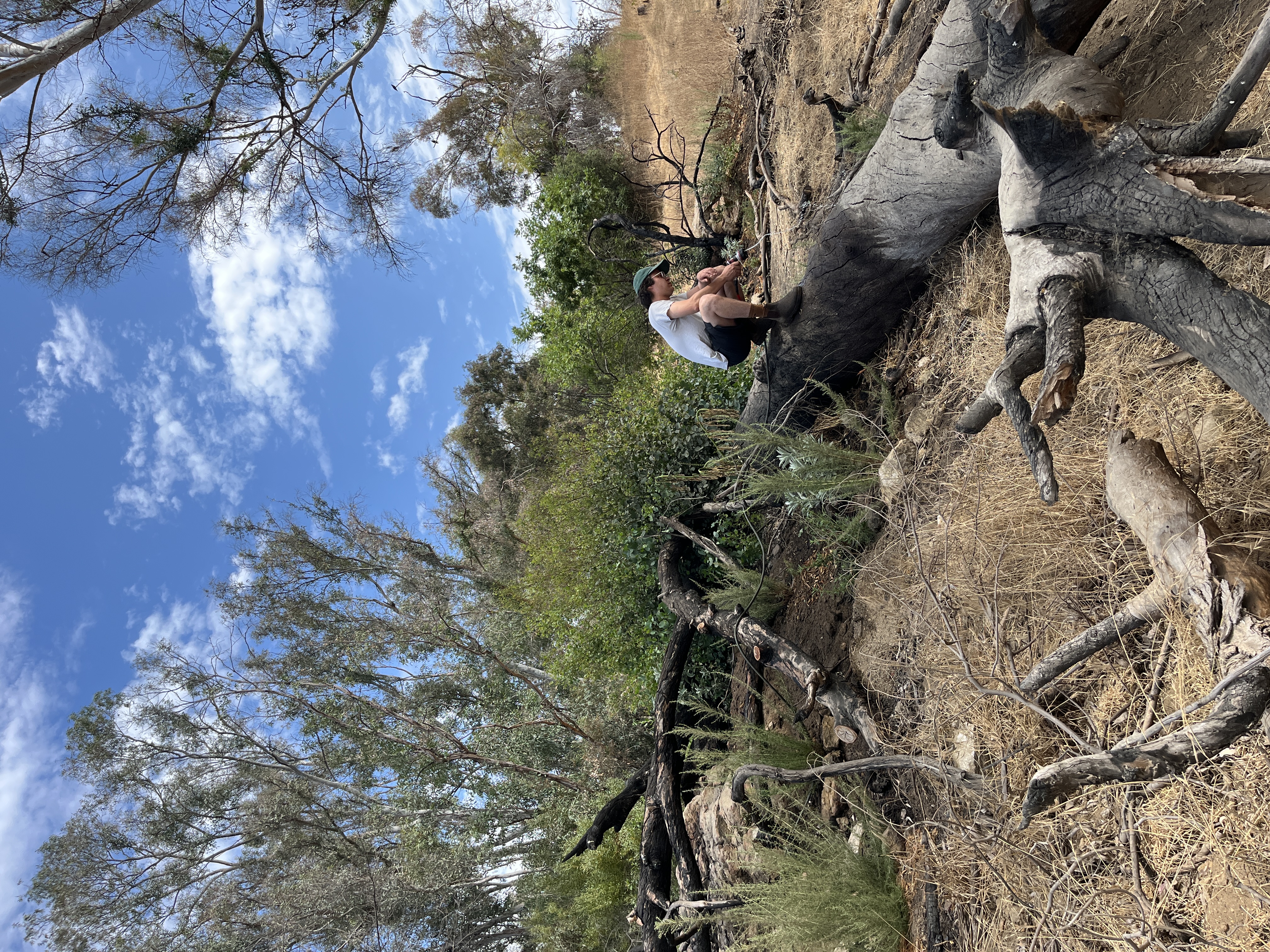

MAY AT THE BURN SCAR
Community Workday
By Hannah Pae
Terremoto
TIME: 8:00-11:30am
DATE: May 17, 2024
TEMP: n/a
WEATHER: overcast
WIND (SPEED/DIRECTION): n/a
SOIL MOISTURE: dry
PLANTS SIGHTINGS:
-Clarkia superbloom
-California Poppy (Eschscholzia californica)
-California Brittlebush (Encelia californica)
WEED SIGHTINGS:
-Black mustard (Brassica nigra)
WILDLIFE SIGHTINGS:
-Eucalyptus leaf beetle larvae (Chrysophtharta m-fuscum)
Brought out the scythes and cut back a lot of the flowering black mustard surrounding the test plot before they went to seed, mulched, and hand-weeded.
Bringing mulch up the hill from the parking lot to the site in wheelbarrows has continued to be a physically strenuous and time consuming affair, so we’ve prioritized mulching around new plants before spreading elsewhere on the test plot.
Community Workday
By Hannah Pae
Terremoto
TIME: 8:00-11:30am
DATE: May 17, 2024
TEMP: n/a
WEATHER: overcast
WIND (SPEED/DIRECTION): n/a
SOIL MOISTURE: dry
PLANTS SIGHTINGS:
-Clarkia superbloom
-California Poppy (Eschscholzia californica)
-California Brittlebush (Encelia californica)
WEED SIGHTINGS:
-Black mustard (Brassica nigra)
WILDLIFE SIGHTINGS:
-Eucalyptus leaf beetle larvae (Chrysophtharta m-fuscum)
Brought out the scythes and cut back a lot of the flowering black mustard surrounding the test plot before they went to seed, mulched, and hand-weeded.
Bringing mulch up the hill from the parking lot to the site in wheelbarrows has continued to be a physically strenuous and time consuming affair, so we’ve prioritized mulching around new plants before spreading elsewhere on the test plot.

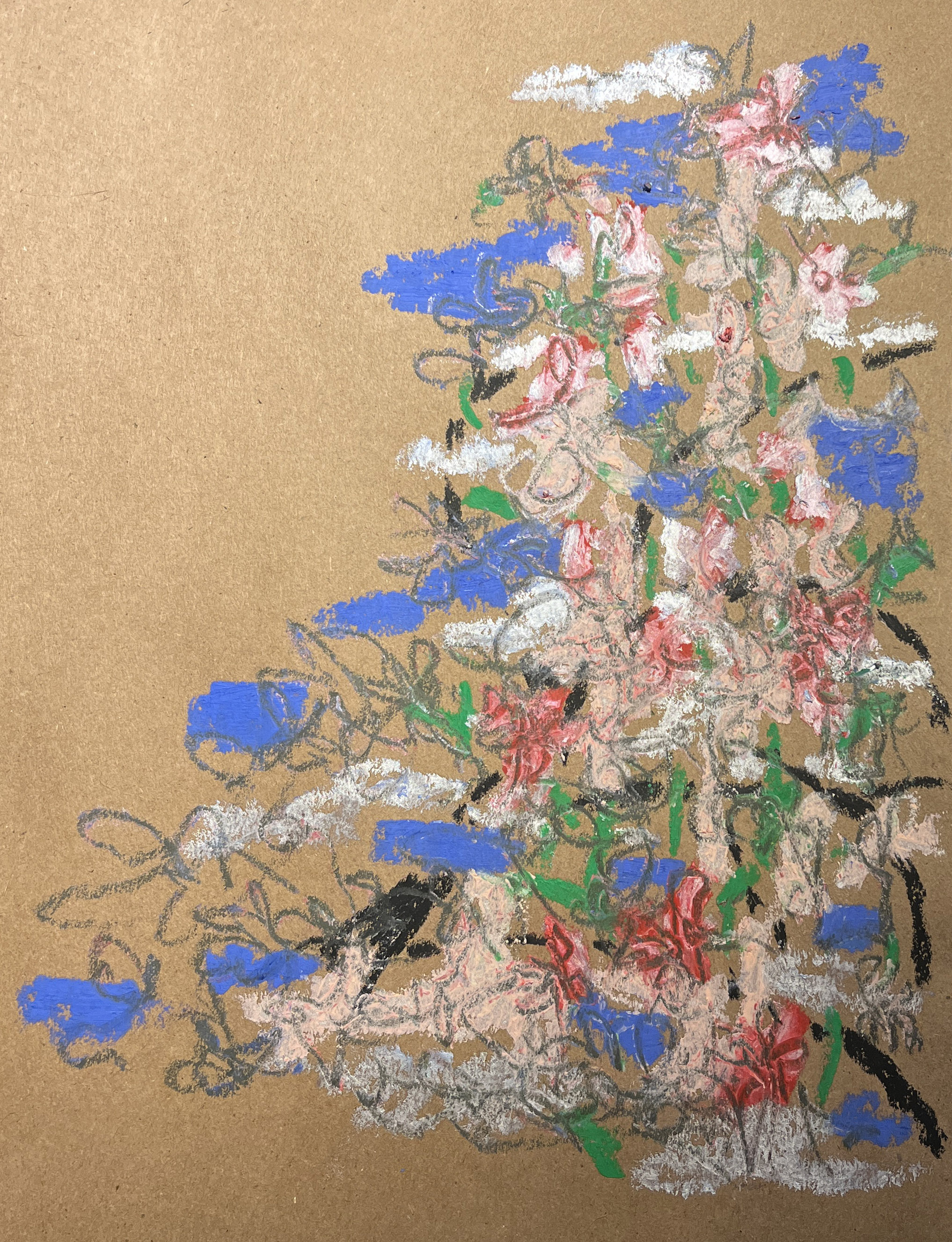


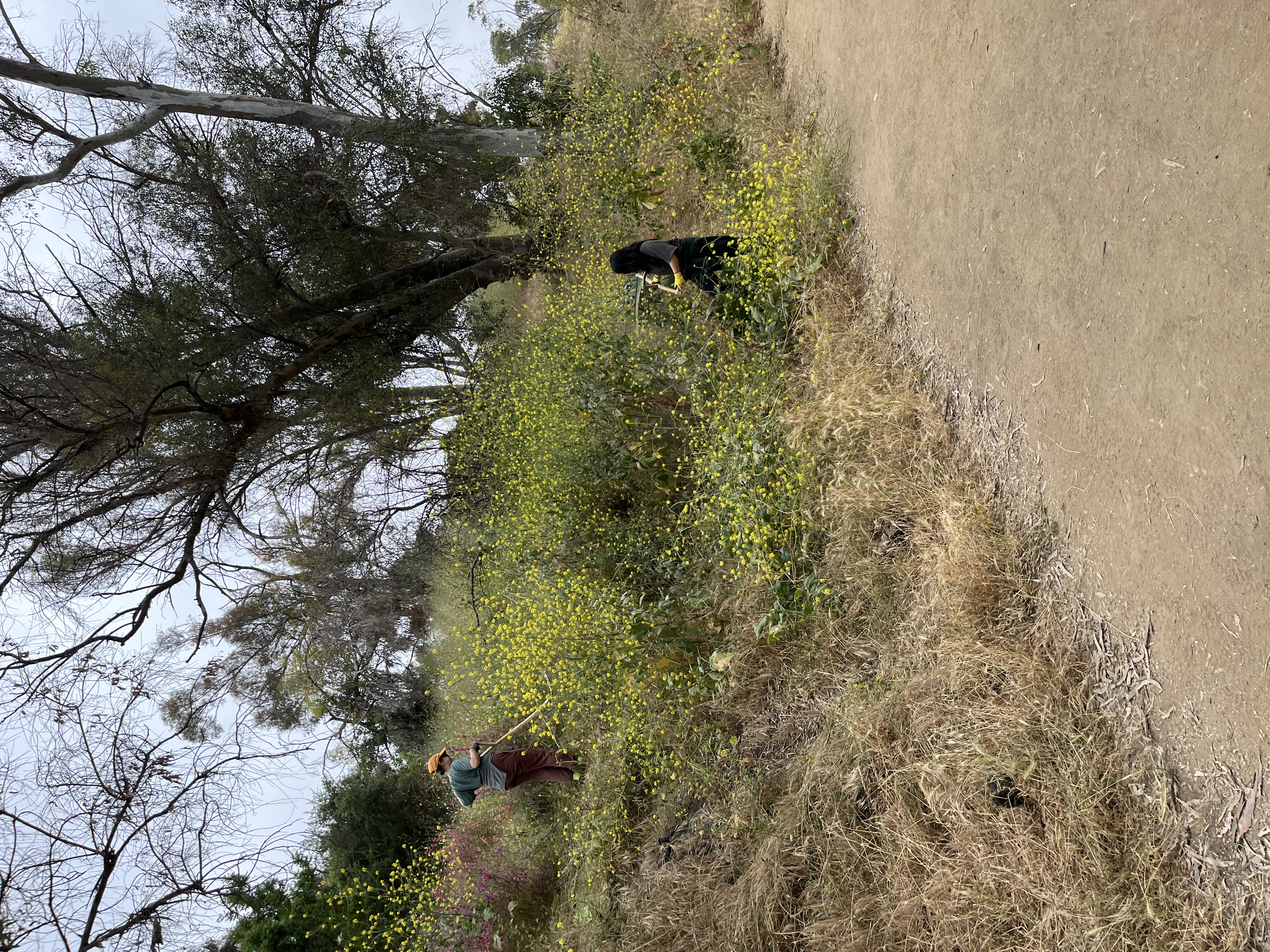
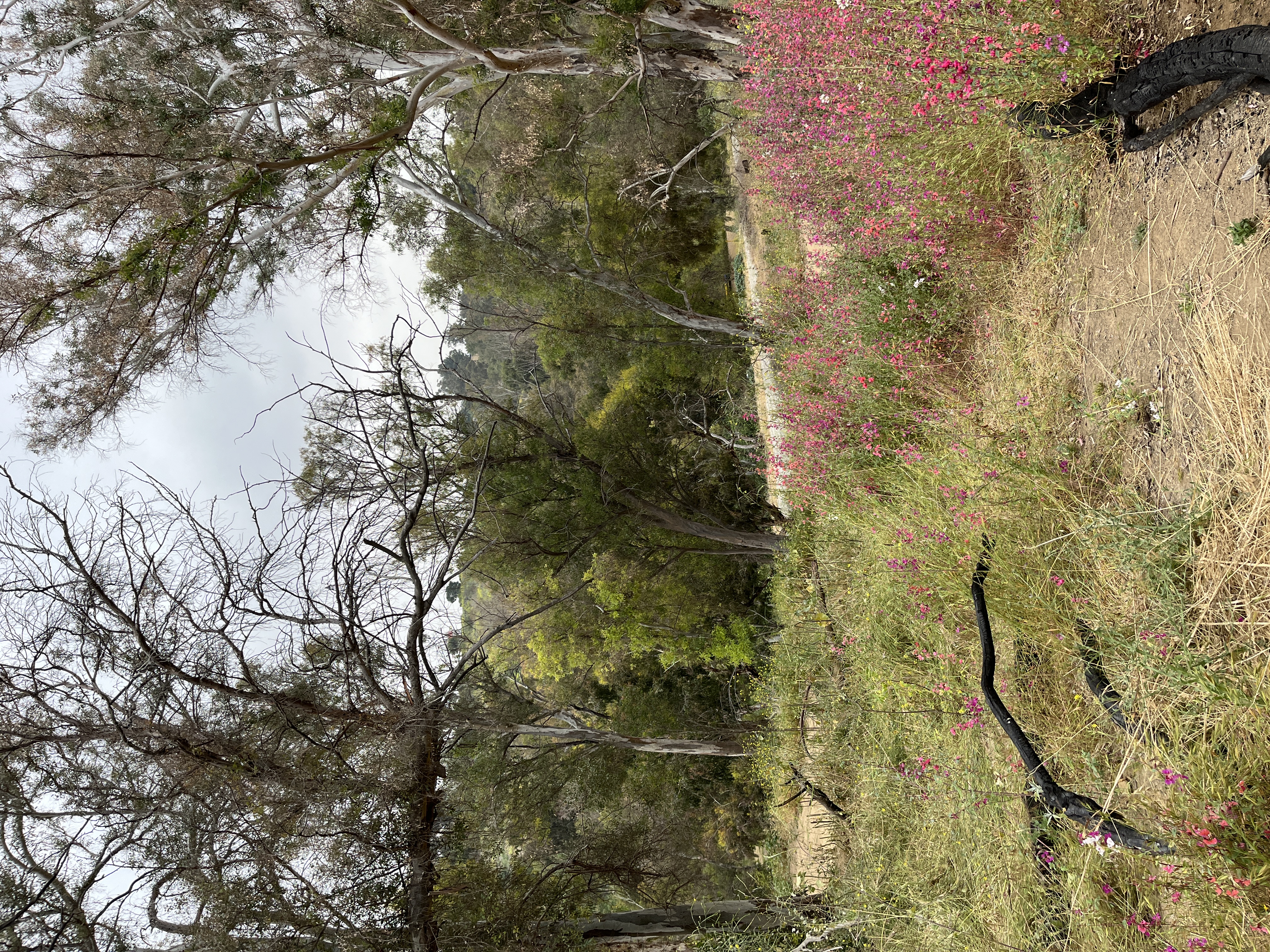
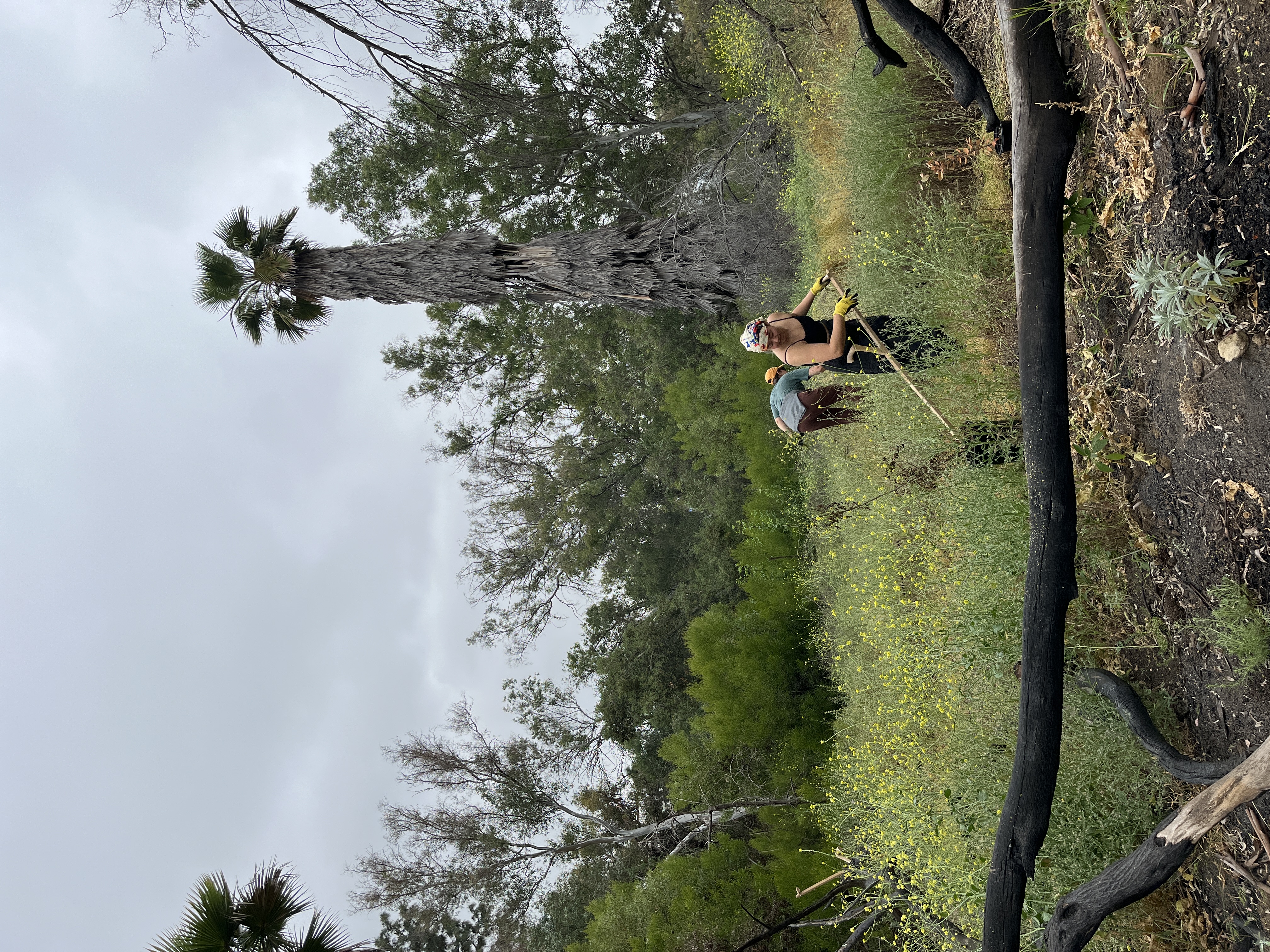

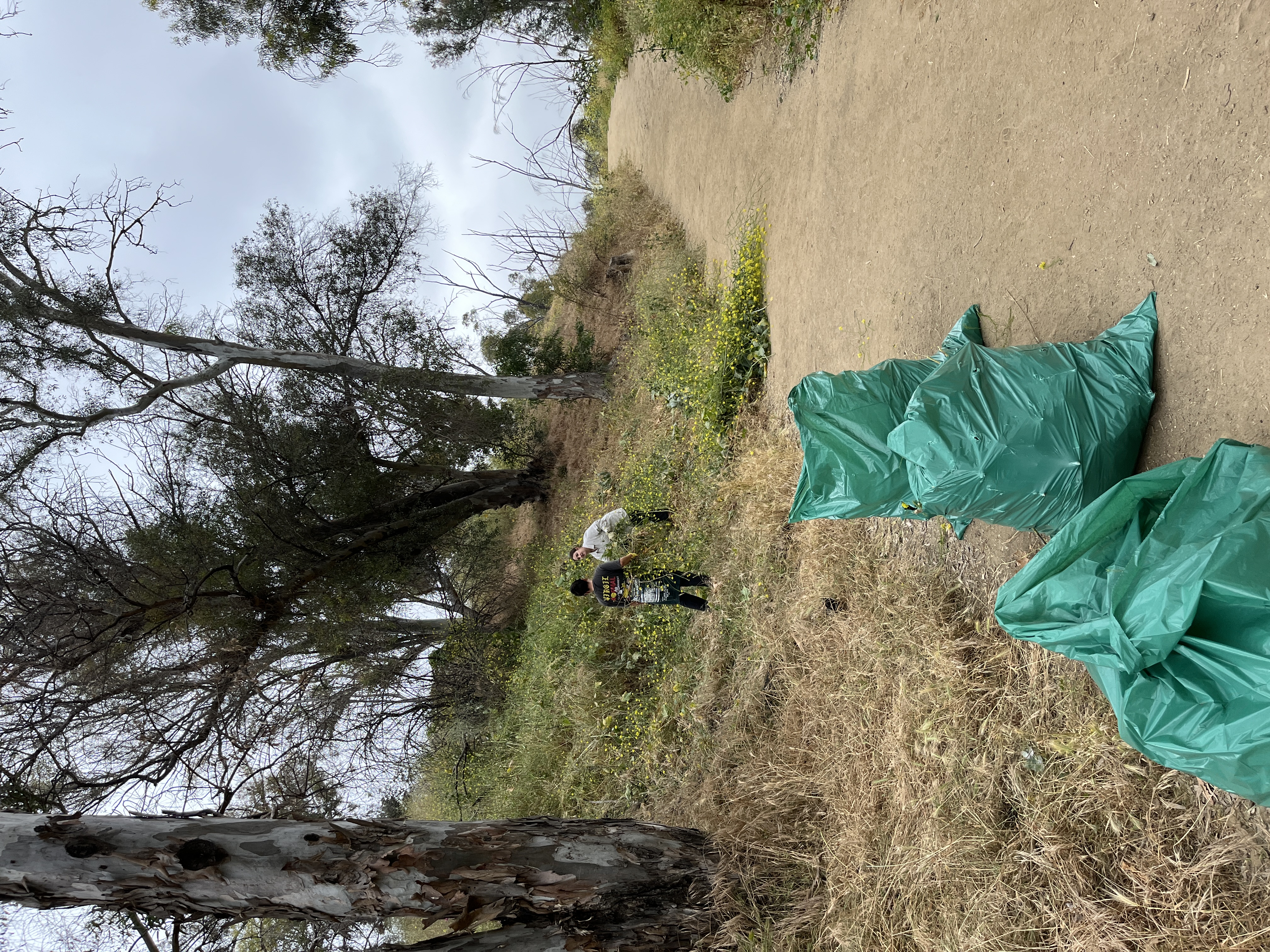

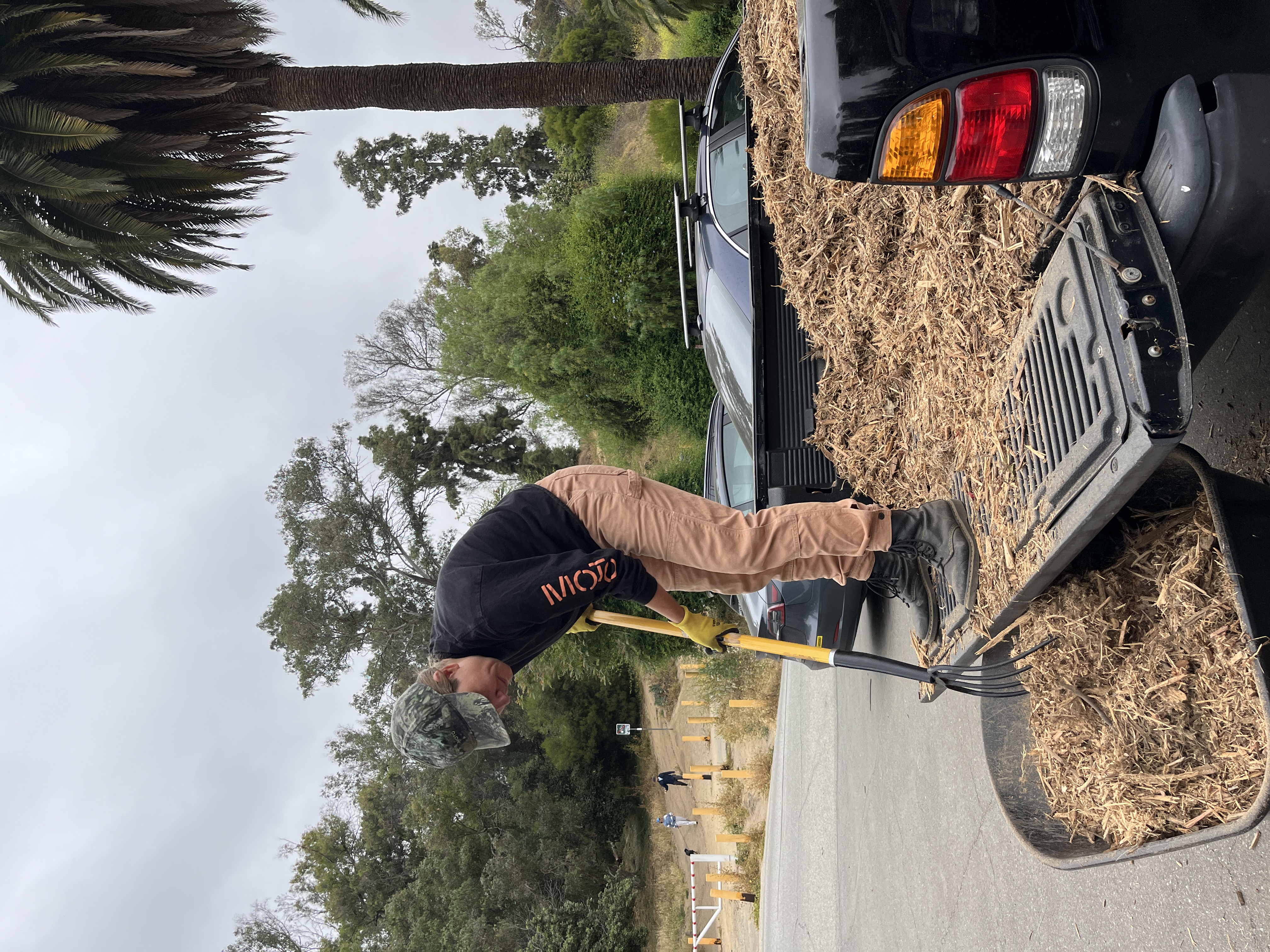
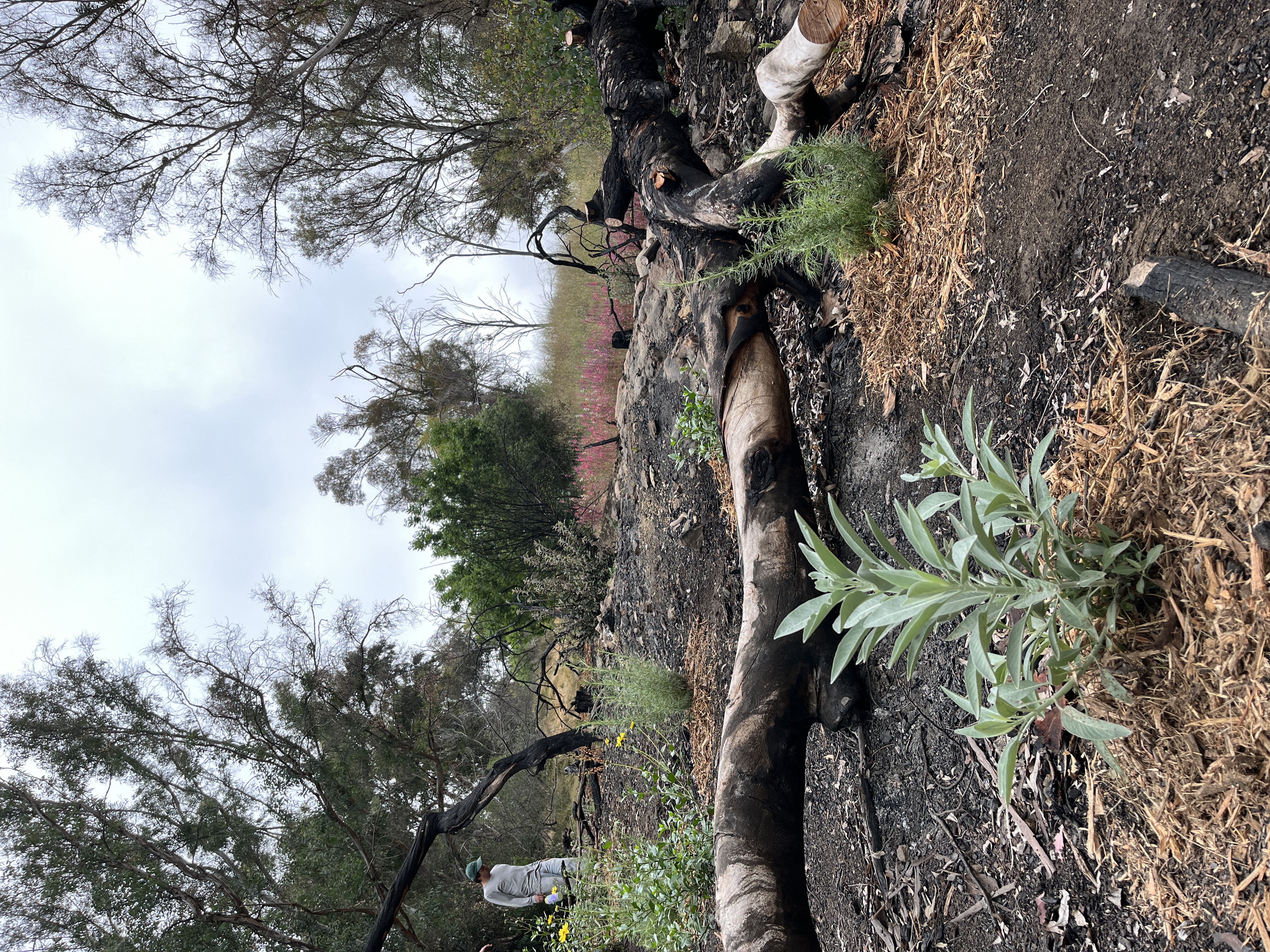
BURN SCAR COMMUNITY WORKDAY
Burn Scar Test Plot
By Hannah Pae
Burn Scar volunteer, Terremoto designer
DATE: April 19 2024
TIME: 8:00-11:30am
︎ WEATHER: Overcast
SOIL MOISTURE: dry
︎PLANT SIGHTINGS: First wave of CA native wildflowers are coming up in full force (see pics below)
WEED SIGHTINGS: Black Mustard (Brassica nigra), Pokeweed (Phytolacca americana), Brome (Bromus diandrus?)
︎WILDLIFE SIGHTINGS: Western fence lizard (Sceloporus occidentalis) and Spider (species unknown)
︎HUMAN ACTIVITY: Good number of trail users
SPECIES ADDED (new species*)
Burn Scar Test Plot
By Hannah Pae
Burn Scar volunteer, Terremoto designer
DATE: April 19 2024
TIME: 8:00-11:30am
︎ WEATHER: Overcast
SOIL MOISTURE: dry
︎PLANT SIGHTINGS: First wave of CA native wildflowers are coming up in full force (see pics below)
WEED SIGHTINGS: Black Mustard (Brassica nigra), Pokeweed (Phytolacca americana), Brome (Bromus diandrus?)
︎WILDLIFE SIGHTINGS: Western fence lizard (Sceloporus occidentalis) and Spider (species unknown)
︎HUMAN ACTIVITY: Good number of trail users
SPECIES ADDED (new species*)
-
Big Berry Manzanita (Arctostaphylos glauca)*
-
Black Sage (Salvia mellifera)
-
California Brittlebush (Encelia californica)
-
Climbing Penstemon (Keckiella cordifolia)*
-
Lemonade Berry (Rhus integrifolia)*
-
Purple Sage (Salvia leucophylla)
- White Sage (Salvia apiana)
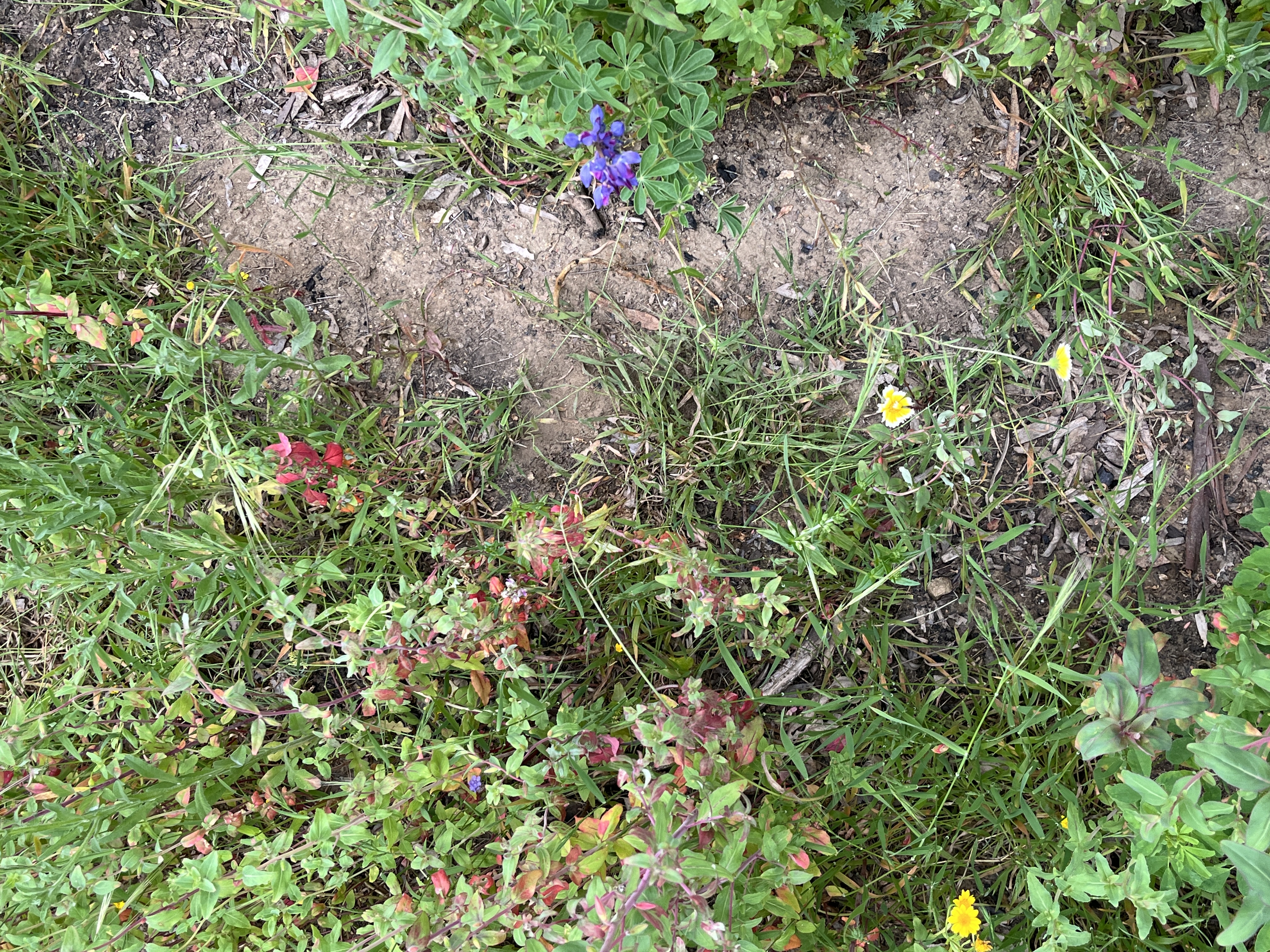

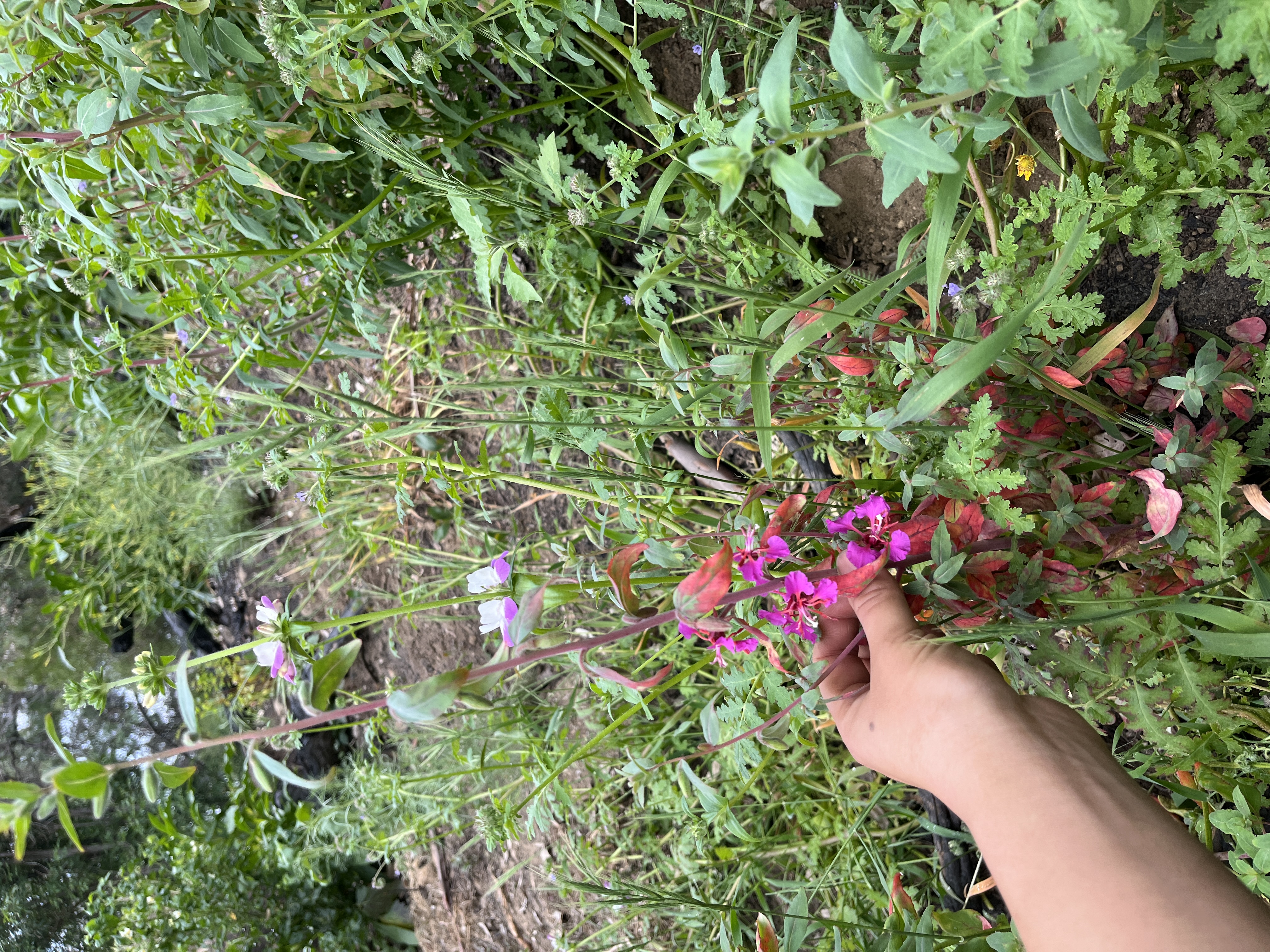
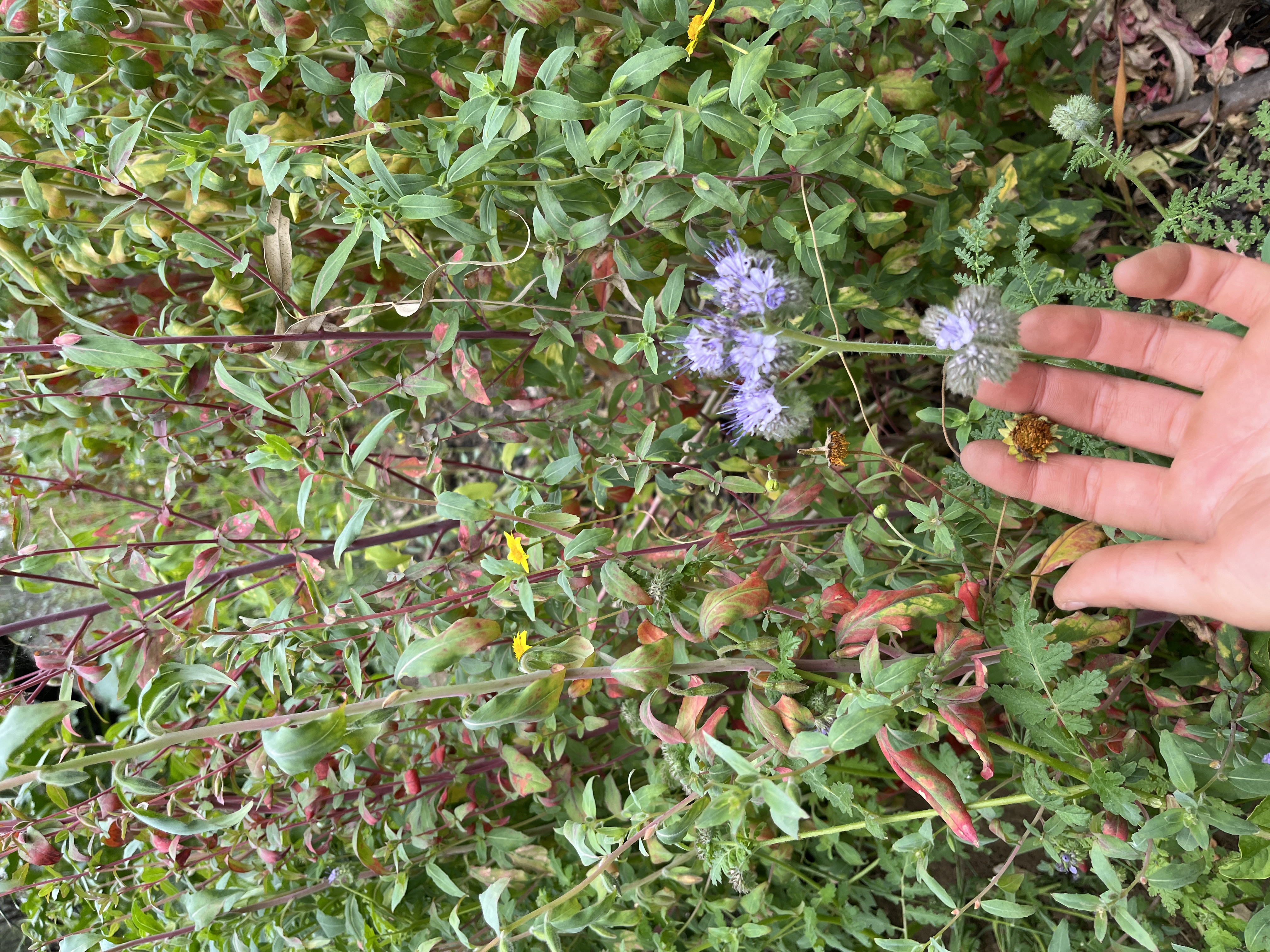
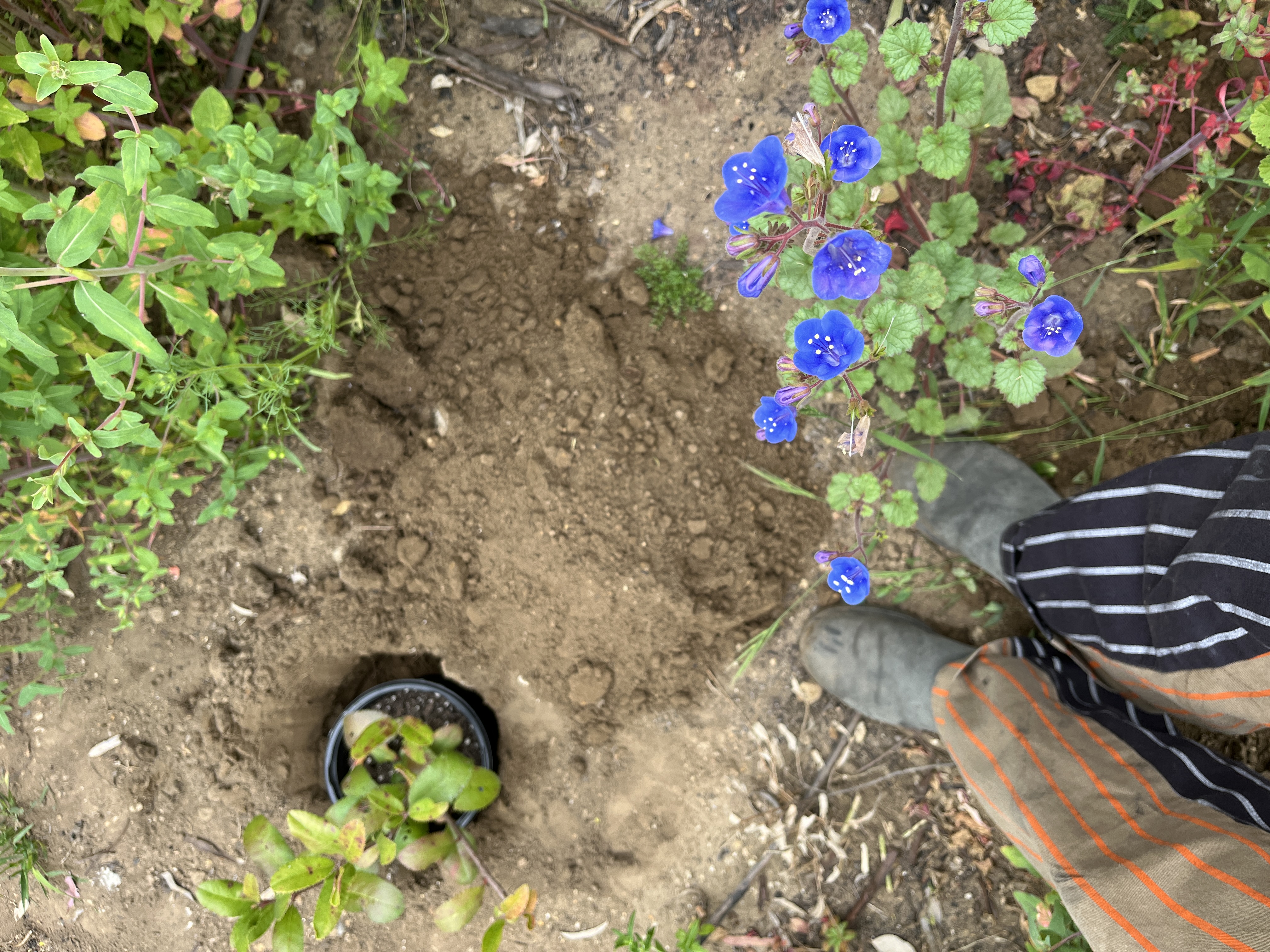

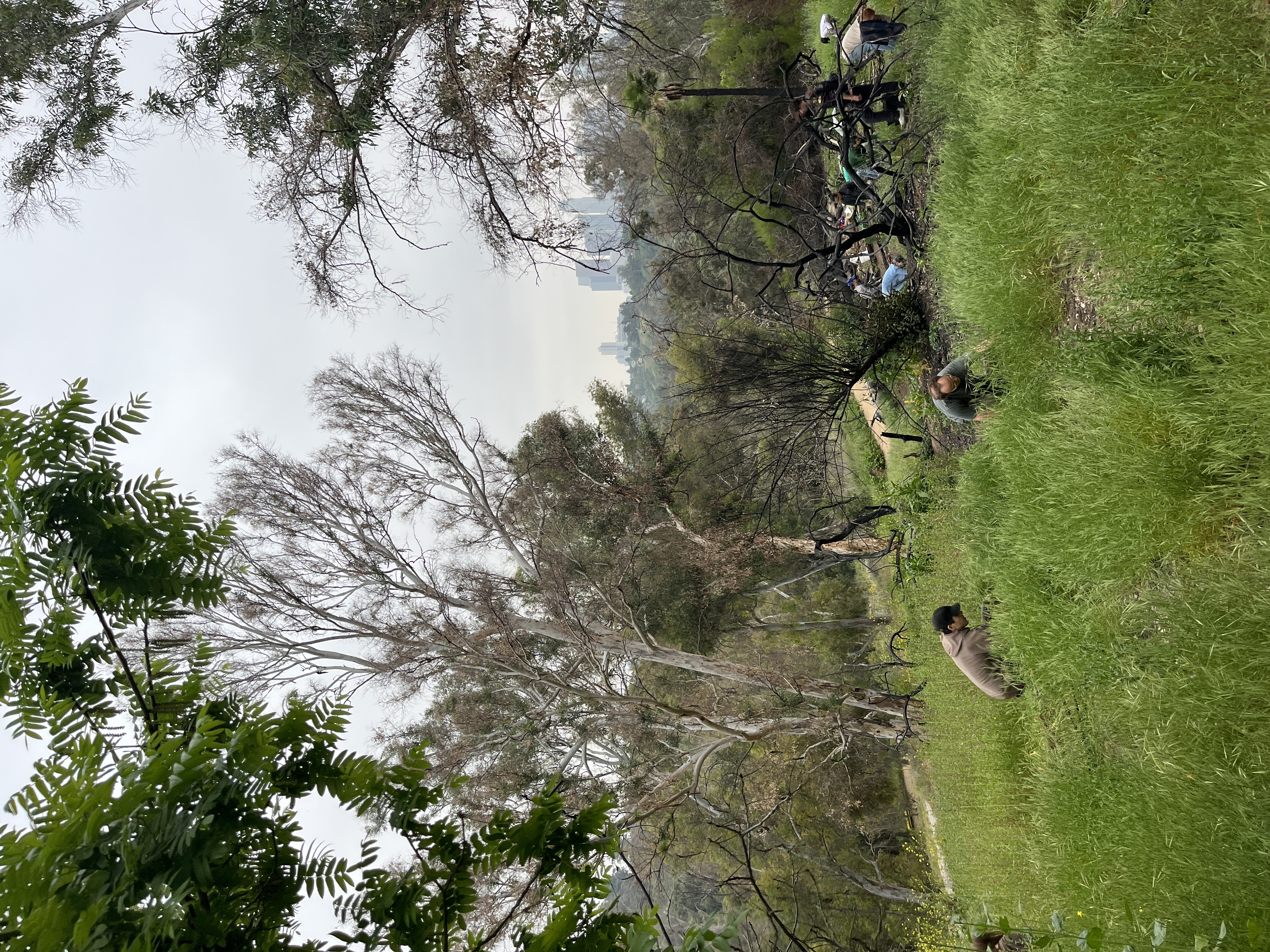






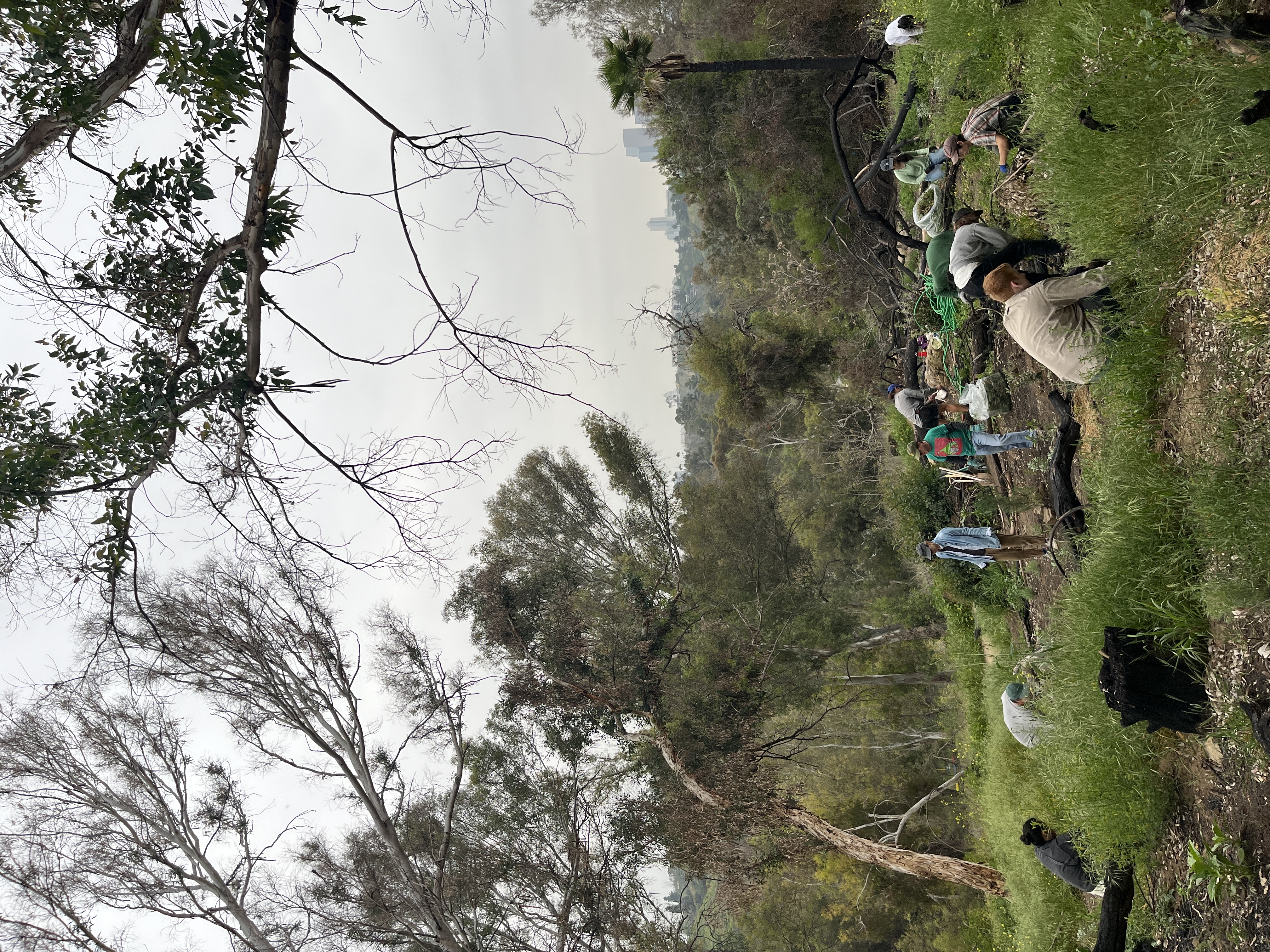






MARCH BURN SCAR , TERREMOTO PLANTING DAY
Burn Scar Test Plot
By Hannah Pae
Burn Scar volunteer, Terremoto designer
DATE: March 29 2024
TIME: 8:00-11:30am
︎ WEATHER: Sunny, blue skies, some clouds
SOIL MOISTURE: dry
︎PLANT SIGHTINGS: See pics below
WEED SIGHTINGS: Black Mustard (Brassica nigra), Pokeweed (Phytolacca americana)
︎WILDLIFE SIGHTINGS: Western fence lizard (Sceloporus occidentalis)
︎HUMAN ACTIVITY: Fair amount of folks walking by on the trail, many w/ pups
SPECIES ADDED (new species*)
Burn Scar Test Plot
By Hannah Pae
Burn Scar volunteer, Terremoto designer
DATE: March 29 2024
TIME: 8:00-11:30am
︎ WEATHER: Sunny, blue skies, some clouds
SOIL MOISTURE: dry
︎PLANT SIGHTINGS: See pics below
WEED SIGHTINGS: Black Mustard (Brassica nigra), Pokeweed (Phytolacca americana)
︎WILDLIFE SIGHTINGS: Western fence lizard (Sceloporus occidentalis)
︎HUMAN ACTIVITY: Fair amount of folks walking by on the trail, many w/ pups
SPECIES ADDED (new species*)
- Black Sage (Salvia mellifera)*
- California Buckwheat (Eriogonum fasciculatum)*
- California Fuschia (Zauschneria californica)*
- California Sagebrush (Artemisia californica)*
- Coastal Bush Sunflower (Encelia californica)*
- Deer Weed (Acmispon glaber)*
- Sacapellote (Acourtia microcephala)*; local source – San Rafael Hills
- Southern Black Walnut (Juglans californica)*
- White Sage (Salvia apiana)*
- Wild Rye (Leymus condensatus)*




